#what he's smoking is up to viewer interpretation :)
Explore tagged Tumblr posts
Text
Tormenting My Coworkers With Rat Michael !

#what he's smoking is up to viewer interpretation :)#i made this while at Work and then taped it to one of the fridge doors so they were subjected to rat michael as well#technically a drawing of#steamboat willie#be free rat michael......
6 notes
·
View notes
Note
https://www.tumblr.com/teamfreewill2pointo/750106101611151360/hi-finale-anon-here-thank-you-so-much-for-your
I’d love to get your take on this post. I don’t agree with it. Supernatural was about Sam’s hero journey which the finale completes the arc established over the 15 seasons.
Why is it difficult for people to see the basic and timeless story construct?
Supernatural is Sam Winchester's Hero Journey, it's all here in the "Hero Journey" tag. Dean Winchester is a very popular character, the awesome sauce but not the main course, which I explained in the "Support Protagonist" tag.
Link. Here I had thought Will viewed the finale through Destiel-rose-colored glasses but it turned out he was interpreting it through BiBro-stanning-lens. And Will's proof that SPN is just as much as about Dean as it is about Sam is, wait for it, "Dean was given a myth arc"', as in singular.... out of 15 seasons. Did he mean season 10? Because according to Jensen, season 10 was a “rare Dean centric storyline” and how "Dean's rarely in this position of being the focal point of the general story's motivation," (X). Is Will disregarding Jensen's own words?
Will: "you can't remove one brother without the whole thing falling apart."
True you can't remove Sam, otherwise there is no story. Once Jared planned to leave SPN, WB canceled the series. Remove Dean and with some minor tweaking, SPN will mostly still be the same (X) but it probably wouldn't have lasted 15 seasons. It would be more like Buffy with 7 seasons. (X)
Will: Sam returned to the ordinary world and got a wife and child because it did it for Dean.
Actually Dean gave his blessing and permission for Sam to return to the ordinary life he always wanted for himself. It's why season 15 clumsily shoehorned "Drag Me Away" episode just a few weeks from the finale to remind the audience that Sam wanted out of the hunting life since he was a kid. Yes Sam went to hell for Dean but it was unquestionable that Sam also did it to save the world. It set Sam apart from Dean's motive for going to hell which was only to save Sam, he didn't care about the world.
Will: "everything Sam did was for Dean".
Yes, by giving up his own desire for an ordinary life so that Dean wouldn't be alone. Sam told Charlie back in season 9 that he only stayed in the hunting life because he loved Dean. But that's not enough for AA stans and even some Bibro stans because they may have realized that Dean and the hunting world is the "belly of the beast" that every protagonist enters as part of their hero journey arc, which goes against their personal biases or agendas.
Will's Anon was only talking up to Return of the Jedi in their Star Wars analogy and Sam never became a witch and he never "used his powers". Holy smoke that was the whole point of depowering Sam after season 5 so that he doesn't end up an ex dues machina! Or am I mis-reading Will's writing and he was actually talking about Sam's power in the first 5 seasons?? Regardless, Sam is NOT a witch, what the heck is Will smoking???
Will, listen to me carefully: Luke's hero journey goal was to become a Jedi. Sam's hero journey goal was to return to the ordinary world. It was never supposed to be a one-to-one comparison, Kripke never said that.
Now we come to Will's streaming value argument by using the 2023 chart to "prove" that the Carry On finale isn't driving equal watch time for each season. How is that supposed to even make sense? Will is ignoring the very basic human nature of simply tiring out from watching so many episodes. The rate of decreasing viewership from season to season is fairly consistent. Unlike hellers, the general viewers will start with the first season and gradually peter out.
A bad series finale will kill the popularity of the show and gets memory-holed. A disappointing series finale will put a big question mark in the rewatch value. "Carry On" finale did none of this because it made narrative sense, as Jensen said when he paraphrased what Kripke told him.
See my "Carry On finale is awesome and here's bunch of reasons why" tag.
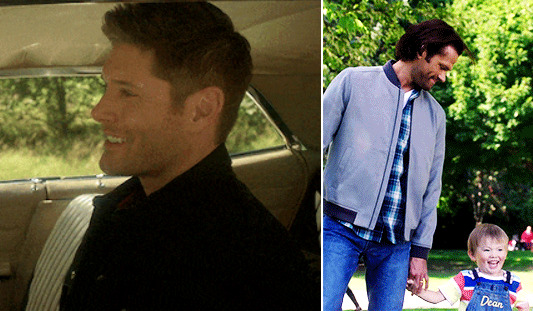
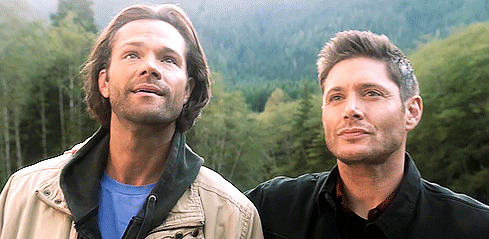
82 notes
·
View notes
Text
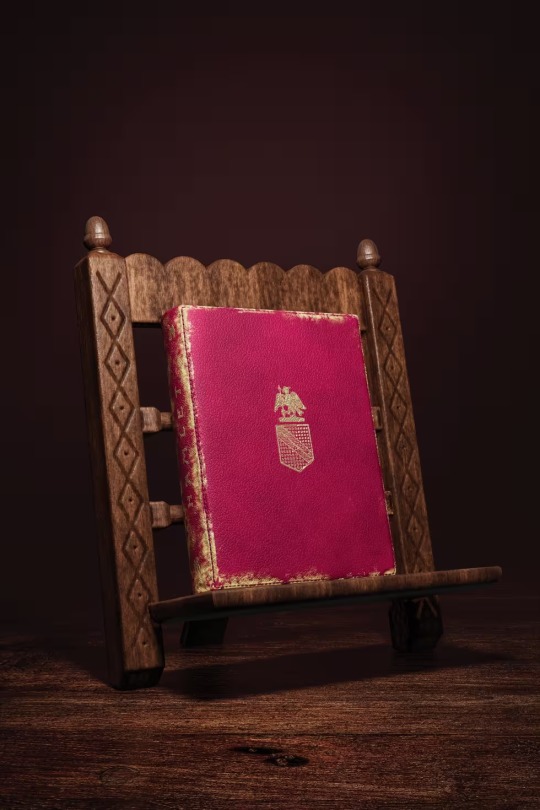
“It must have been in about 1979, I was in New York on holiday. I was sitting up with a friend, and we were both stoned as owls.” Jane Wymark was retelling her brush with a piece of theatre history. She recalled the sound of a telephone cutting through the sour, rising smoke. Wymark answered. Distant and absurd on the other end of the line, a telegram message from her mother. “It said something like: ‘Wonderful job. Hamlet, please come home.’”
After several minutes of laughter, it occurred to Wymark that the call might not be a joke. “So I rung my mother up, and said ‘I’m really sorry if I’m waking you up in the middle of the night for no reason, but is this real?’ And she said, ‘Yes, come home right now, because they want you to play Ophelia.’”
Wymark was being parachuted into a production of Hamlet that was being talked about as among the best of the century. Derek Jacobi, a Shakespearean actor then in his forties and recently made famous by his star turn as the Roman emperor in the television series I, Claudius, was in the title role. In some quarters, Jacobi’s poetic, volatile performance was being talked about as the Hamlet of his generation.
A film of the production would be broadcast in America and viewed by more people at once than any in history. When The New York Times asked Jacobi how he felt knowing that a generation of viewers would come to consider his interpretation definitive, he replied: “That way lies madness.”
One night, Wymark recalled, the cast were taking their bows in the furnacelike auditorium. “By the time we got to the end of the show we were pouring sweat,” she said. “Well I wasn’t, because I’d been dead for a while, but Derek and the guy playing Laertes were just sopping. We’d done all the usual curtain calls and everything, and then Peter O’Toole comes wavering on to the stage.”
O’Toole, then almost 50 and skeletal-gaunt, was carrying in his hands a little red book. As the audience hushed he explained that the book was given to the actor who was considered the definitive Hamlet of his generation. When O’Toole had played the part in 1963, the actor Michael Redgrave had given him the book. Redgrave had been given it by someone else, a great actor of the previous generation, and now O’Toole was passing it on to Jacobi, who in turn could give it to whomever he pleased.
The notion that each generation has its definitive Hamlet is a critical will-o’-the-wisp that has dogged the play almost since it was written. The Edwardian essayist Max Beerbohm called Shakespeare’s most famous part “a hoop through which every eminent actor must, sooner or later, jump”, but only one actor in thousands gets to “give” his or her Hamlet in a professional production. “Everyone — great, good, bad or indifferent — wants to play Hamlet,” the actor Christopher Plummer once said.
Why? The question feels redundant. If you are someone who needs to perform, you are someone who needs to perform Hamlet. In Withnail and I, the 1987 cult comedy film about actors and their ambitions, the bloated, fey, lecherous character known as Uncle Monty has a short speech on the subject: “It is the most shattering experience of a young man’s life when, one morning, he awakes and quite reasonably says to himself, ‘I will never play the Dane.’ When that moment comes, one’s ambition ceases.”
Earlier this year, I set out to find the red book.
As a trophy, a tradition, a secret succession, it seemed to embody some of the most romantic ideas about the part. I felt that in mapping its passage from player to player, I could trace a shadow history of the thing that has been driving the whole theatrical world for centuries: ambition.
This is what brought me to ask the retired Wymark about her encounter with the book. And this is how I eventually came to be standing outside a rambling, gabled cottage in north London, uncertain about whether to ring the bell until a vast Shakespearean sneeze told me I was at the right place. The door opened and I shook hands with a neat, elderly man who looked just like Derek Jacobi. The living room, decorated with antique furniture and hung with flower paintings, left an impression of a precisely chosen life. I said that I wanted to ask him about a red, leather-bound book, handed down from actor to actor, that had passed through his hands decades ago. I said he might be the oldest living actor to have held it in his hands. He furrowed an alpine brow and fixed his pale blue eyes on a tiny point just past my left eye. “Oh God,” he moaned, in an agony of remembrance. “It was a little copy of Hamlet . . . ”
Of course, there is no definitive Hamlet. This is true, and so obviously true that people have been saying it for hundreds of years. “There is no such thing as Shakespeare’s Hamlet,” wrote Oscar Wilde. “There are as many Hamlets as there are melancholies.” This is true! Hamlet is sour, obedient, suicidal, sarcastic, self-indulgent, flip and outright murderous before the end of his second scene. Modern scholarship has been wincingly keen to stress the heterogeneity of possible responses. As I once heard a professor say in a university seminar, should we be speaking of Hamlets, rather than Hamlet?
Perhaps. But we should also be honest: that sucks and we hate it. We also can’t ignore the genealogy of great Hamlets that exists, stretching all the way back to Richard Burbage, Shakespeare’s star performer and business partner, for whom the role was written. That the character and the play are both radically unstable and look totally different in different hands seems to have made us more eager to pinpoint a single actor’s performance as the one. Producers, theatre managers, actors and journalists have connived to reinforce that idea.
Hamlet does offer an actor a scope and centrality that no other part does. “It’s the great personality role in Shakespeare,” Jacobi explained when we were sitting down, his hands conducting the silence around him as he spoke. He had settled in a winged leopard-print armchair, like a portrait of himself. On the side table was an Olivier Award, a small bronze sculpture of the great Laurence Olivier himself, the man who won both Best Actor and Best Picture for his 1948 film of Hamlet, and then launched the National Theatre in 1963 with a production of the play. “You use much more of your own personality as Hamlet,” Jacobi said, “rather than becoming Hamlet by going out and acquiring things. . . Hamlet will look how the actor looks, sound how he sounds, move how he moves. You play yourself as Hamlet.”
Jacobi first came to prominence as a teenage Hamlet, in an eye-catchingly serious schoolboy production at the Edinburgh festival fringe. In his early twenties he joined the germinal National Theatre and played opposite O’Toole’s Hamlet as Laertes. In his forties, he was given the red book by O’Toole, filmed in the role and toured the world. He was sworn to revenge under sheets of pelting rain outside the real Elsinore castle in Denmark. He soliloquised and played mad by the Egyptian Sphinx as the sun set.
A particular challenge of playing the part, Jacobi told me, is delivering lines so famous they risk breaking the audience’s suspension of disbelief. In his production, the second act began with Hamlet’s most famous soliloquy. Unusually, it was played as a speech delivered to Ophelia, rather than on an empty stage. In Sydney, at the end of the tour, Jacobi was waiting nervously in the wings. “I thought, ‘This is probably the most famous line in all drama. What if I forgot it? What if I went on and my mind went blank?’ And I went on, and I started . . .
“To be, or not to be, that is the question/ Whether ’tis nobler in the mind to suffer/ The slings and arrows of outrageous fortune/ Or–
Or–
Or–
Or–”
Blinded to the astonishment of a thousand spectators by the force of the footlights, Jacobi realised he’d dried. Dried completely. It wasn’t like he’d forgotten the words. It was like he’d never known them. An entire minute of silence passed, until he was audibly given his line by Ophelia. Somehow, he got through the performance and the rest of the run. Afterwards, Jacobi didn’t go on stage again for two years. When I mentioned the incident, his eyes turned tight and hooded. He asked to talk about something else. Sensing my cue, I returned to the red book.
“Oh God. Rich!” he called into the next room. “Who did I give the book to?”
“You gave it to Ken Branagh,” called Richard Clifford, Jacobi’s partner, from offstage.
“Ken! I gave it to Ken,” said Jacobi. Then, calling back: “Who did Ken give the book to?”
“Tom Hiddleston!”
“Tom! He gave it to Tom.”
I asked how he had received the book himself and he went back into the trance of remembrance. “Now, I was playing Hamlet at the Old Vic. And at the curtain call one night, Peter O’Toole came on to the stage with this book and gave it to me. And he had originally been given it by . . . Oh . . . ” He trailed off, unable to remember Redgrave.
“Oh!” cried Clifford from the kitchen.
“Oh!” cried Jacobi in the living room.
Johnston Forbes-Robertson. That was the name of the first owner of the red book. Forbes-Robertson was a legendary Victorian actor who played Hamlet into his sixties. The book itself was a Temple Shakespeare, a handsome reader’s edition of the play printed around the turn of the century and bound in red leather. He probably bought it in a West End bookshop, pacing around between rehearsals. Or so I’m told by Russell Jackson, an emeritus professor at the University of Birmingham. “It would have been instantly recognisable,” he told me. “You can hold it more or less in the palm of your hand.”
In 1996, Jackson was working as a script consultant on a film of Hamlet directed by Branagh, who was then in the middle of a hurtling, flame-tipped ascent to near-unprecedented eminence among Shakespearean actors. As a leading man who had run his own theatre company and could direct and star in internationally released film adaptations of the plays, there was no one to compare him to but Olivier. He was now at work on a princely four-hour fantasia, shot amid fake fallen snow at Blenheim Palace with himself in the starring role.
He had cast his old hero, Jacobi, as Hamlet’s murderous uncle Claudius. On his last day of shooting, after the traditional applause that follows a final take, Jacobi asked for silence. Jackson kept a diary at the time: “[Jacobi] holds up a red-bound copy of the play that successive actors have passed on to each other, with the condition that the recipient should give it in turn to the finest Hamlet of the next generation. It has come from Forbes-Robertson, a great Hamlet at the turn of the century, to Derek, via Henry Ainley, Michael Redgrave, Peter O’Toole and others. Now he gives it to Ken.”
Hamlet had been a pivotal document in Branagh’s life. As a teenager in 1977, he had seen Jacobi play the role at the New Theatre in Oxford. In his memoir, he remembers it as one of the moments that inspired him to become an actor. “I didn’t understand it at all, but I was amazed by the power of it because it seemed to be affecting my body. I got the shakes at times.”
Two years later, Branagh went to interview Jacobi, who was then playing Hamlet at the Old Vic. “I got a note from someone called Ken Branagh, saying, could he interview me for Rada’s magazine?” Jacobi told me, referring to the prestigious London acting school Branagh attended. “He was a personable young man. He asked good questions. As he left, he said: ‘I’m going to be playing Hamlet one day, and you’re going to be in it.’”
“Ken,” Jacobi added with a smile, “wasn’t slow in coming forward.”
It was no secret that Branagh had set his sights on matching, even reanimating, Olivier’s career. With his movie of Hamlet, he was threatening to run away with the crown. But while the film won plaudits from some critics, it made back only around a quarter of its budget, and Branagh was nominated only for best adapted screenplay at the Oscars, a curiously backhanded compliment for a Hamlet that advertised itself as the complete text.
Branagh held on to the book for more than 20 years, passing over several acclaimed Hamlets (David Tennant’s agonised spectre foremost among them) in that time. “I took special pains to make sure it was preserved,” said Branagh, who was reached with written questions via an agent and an aide during the shooting of his new film. “I felt the book was something rather treasured and private, and not something that you in any way crowed about. You were a temporary custodian.” In 2017, he finally handed the red book on to the actor sometimes thought of as his protégé, Hiddleston.
So there it was. Redgrave to O’Toole to Jacobi to Branagh to Hiddleston. But still, something wasn’t adding up. I began desperately ringing round old actors asking for snippets of information about the red book, and started reciting the list of names from Jackson’s diary entry: Forbes-Robertson, Ainley, Redgrave, O’Toole, Jacobi, among others. Every time I read the list, everyone said the same thing. Where the hell is Olivier?
Here is a story about Laurence Olivier. Once upon a time, in the early 1800s, there was a great Shakespearean actor called Edmund Kean. He was the Hamlet of the Romantics. Samuel Taylor Coleridge wrote that watching him was “like reading Shakespeare by flashes of lightning”. Kean was also renowned for playing Shakespeare’s other great soliloquist, Richard III. As the hunchbacked villain, Kean would rage and swagger and strut about, swishing a great sword in his hand. That sword was passed to William Chippendale, a member of Kean’s company. Chippendale gave it to an actor called Henry Irving, who gave it to the great Ellen Terry who, we understand, gave it to her great nephew. His name was John Gielgud. Gielgud gave the sword to his contemporary, Olivier, telling him to pass it on to the great actor of the next generation. And Olivier kept it.
He is rumoured to have been buried with it. Certainly, the sword has not been seen since his death. (One of the last people to see it was Jacobi, who confirmed to me that Olivier still had it as a very old man.) Is Olivier really lying in his grave with no tongue between his teeth and Kean’s sword beside him? If he is, it feels like a little parable about the sharp, inward points of ambition. Here was a man who got everything and more from a life in the theatre. But he couldn’t bear to part with a prop sword.
The question of why Olivier never received the book becomes more pressing when you read the letters he received playing Hamlet from the Edwardian actor Henry Ainley, the book’s second owner. On opening night, January 5 1937, Ainley telegrammed Olivier in his dressing room: “THE READINESS IS ALL.” Later that night he wrote: “You, my sweet, are the Mecca . . . Pay no heed to the critics, they do not know. You are playing Hamlet; therefore you are a king [ . . . ] You rank, now among the great.”
Ainley’s hornily free-associating letters seem to imply a physical affair at times. “Larry darling, I have been tossing (now now) about at night thinking of you,” he writes in one of the letters, currently kept by the British Library.
“Well, you know what you did. I can’t walk [ . . . ] And the child has your eyes.” Yet it is Olivier’s fame that Ainley most obviously covets. “Soon you will be like [me],” he writes in another. “Your public, your following all gone, dear old boy! The harlequinade. We do not endure!” There is no mention in their correspondence of the red book. Whether Ainley had already given the book away, or felt compelled to hang on to it, or simply had forgotten it, remains a matter of speculation.
It’s not the only agonising gap in the archive. In 1963, an older Olivier cast Peter O’Toole in the production of Hamlet that would open the National Theatre. O’Toole had already played a wild, revelatory Hamlet at the Bristol Old Vic in 1958, in which he famously climbed the proscenium arch mid-performance. It was an interpretation that harnessed the young actor’s modernity. “He’s a lean, lank, individualist Teddy Boy!” one reviewer enthused.
But in 1963, Olivier had other ideas. “It was very strange,” remembers Siân Phillips, O’Toole’s then wife, now aged 91. “Larry [Olivier] had talked him into this terrible costume. He looked like Little Lord Fauntleroy, with a Peter Pan collar and clean, beautifully cut dyed blond hair.”
Phillips thought Olivier seemed to want to trim the edges off her husband. “Larry had this new kind of concept of a very tidy Hamlet, which was the opposite of what [O’Toole] did best. But he had such regard for Larry, who was flattering him enormously. He just did everything asked of him.” Phillips had put her own starry career on hold to let O’Toole have the spotlight. She did his filing and kept track of gifts he had been given, making sure people were thanked, which was why she found it strange that she’d never heard of the red book.
Together, we wondered if the unhappy production had made it a sore point for her husband. “The thought did cross my mind once or twice that Olivier might be trying to sabotage him,” she said. “But how could he want to do that on the opening night of the National Theatre?” On the other end of the phone, I thought of Kean’s sword.
Perhaps this is harsh. Perhaps we can understand the desire to have and hold on to a physical token of fame, strength, adulation, applause, youth — the things that slip away from even the greatest artists. All performers live in fear of unemployment and redundancy, and even the successful ones are loved, fiercely and temporarily, for being someone they’re not. “Today kings, tomorrow beggars, it is only when they are themselves that they are nothing,” wrote William Hazlitt, the English essayist.
“British theatre has traditionally privileged innovation,” the Shakespearean scholar Michael Dobson told me. In France, he explained, you could see Phèdre performed with the same gestures, the same intonation, for hundreds of years. “The British are always inventing new things, like gas lighting and ways of doing ghosts with mirrors. It’s never the old, boring Hamlet your parents used to like. It’s always got this young, original, absolutely real actor in it, instead of those stylised old geezers.”
In which case, let us sit upon the ground and tell sad stories about great actors who fell from fashion. It was Burbage who first delivered Hamlet’s acting advice to the players: “O’erstep not the modesty of nature: for any thing so overdone is from the purpose of playing, whose end, both at the first and now, was and is, to hold, as ’twere, the mirror up to nature.”
Until the modern day, actors didn’t play big roles just once or twice in their careers, in a long run of performances. They performed them frequently. Even in Shakespeare’s time, actors became associated with certain parts in the minds of spectators. Burbage died in March 1619, and the funeral baked meats were hardly cold when he was replaced by another actor, Joseph Taylor.
An unreliable but enticing story has it that Burbage taught Taylor, and Taylor taught the next great Hamlet, Thomas Betterton. Betterton was the Hamlet of Restoration theatre, among the first to play opposite women. Confronting his father’s ghost, Betterton’s Hamlet could “turn his colour”, as though his face had drained of blood with fright. Betterton made his face “pale as his neck cloth”.
Betterton died in 1710, immortality assured. Within a few decades his reputation had been all but vaporised by the greatest actor of the century, David Garrick. Garrick was almost a religion among theatregoers. “That young man never had his equal as an actor, and will never have a rival,” was the poet and critic Alexander Pope’s verdict. Garrick was both a shameless showman and pioneering realist. He played Hamlet in a mechanical fright wig that made his hair stand on end when activated.
Garrick was replaced by John Philip Kemble, a severe and statuesque Hamlet. In the early 19th century, Kemble was outmoded by Kean, whose ascendant star was quickly selling out theatres. “Places are secured at Drury Lane for Saturday, but so great is the rage for seeing Kean that only a third and fourth row could be got,” wrote Jane Austen, struggling to get seats. Out with the old. Next came Samuel Phelps, the actor-manager who first made a point of performing the original texts of Shakespeare’s plays. He was toppled by Henry Irving, a drawn and gothic actor. Irving was supposedly the inspiration for Dracula; his theatre manager was Bram Stoker.
Enter the melancholic, effeminate figure of Forbes-Robertson, the first owner of our red book. His Hamlet, first performed in 1897 and still being revived into his sixties, was in some ways the last definitive stage performance in this unofficial, highly debatable but surprisingly enduring tradition. “Nothing half so charming,” George Bernard Shaw wrote of his performance, “has been seen by this generation.” Orson Welles described one recording of Forbes-Robertson as the most beautiful Shakespearean verse-speaking he ever heard. You can still listen to it on YouTube, uploaded from an ancient LP.
“The next reference to the actor’s art,” creaks the old voice above the hiss of imperfectly transcribed sound, “is Hamlet’s advice to the players, written, obviously, by an actor who has complete command of his calling.” In a voice ponderous with time but still capable of lightness and precision, he begins the passage in which Hamlet gives notes to a theatrical troupe. “Speak the speech, I pray you, as I pronounced it to you, trippingly on the tongue.”
Forbes-Robertson would have seen more clearly than many of his successors how rapidly the galaxy of theatrical ambition was expanding. He was the first great Hamlet to play the part on film, in a lumpy silent production in 1913. If that film looks stagey and stylised to modern eyes, then looking back at these nested revolutions in realism, it’s also obvious that old actors have always looked that way in the eyes of their successors. Naturalism is just the style each era brings with it.
Hamlet’s advice was itself part of this reach towards the endlessly receding goal of the real. To an Elizabethan audience, the travelling troupe with their heroic verse and stagey couplets would have seemed obviously to belong to a previous generation of players, one playwrights like Shakespeare, and plays such as Hamlet, were making redundant. Hamlet says to the players what the theatre is always saying: be young, be modern, be new.
You can’t ask too much of very famous actors. Basic professionalism demands that they don’t tell you anything too interesting. They live like criminals, travelling under pseudonyms and booking the front seat on aeroplanes. We abhor in their personal lives the basic human latitude we praise in their work. “I am myself indifferent honest yet I could accuse me of such things that it were better my mother had not borne me,” Hamlet says to Ophelia. “What should such fellows as I do, crawling between heaven and earth?”
I had hundreds of questions for Hiddleston, the 43-year-old star of the Marvel Cinematic Universe and current holder of the red book. Unfortunately, Hiddleston is not an easy man to reach. As the man who plays Loki in the Marvel series (global gross about $30bn), he has been watched at his craft by an unimaginable number of human eyes. He does his work in green-screen and widescreen settings that would also have been unimaginable to 90 per cent of the people named in this article. Where Burbage played Hamlet without an interval, Hiddleston’s fame is a postmodern mosaic, put together in franchise films with an average shot length of two seconds. Given that he commands multimillion-dollar fees for these acts of cinematic pointillism, you may imagine his time is precious. I was able to reach him by phone for 15 minutes during press week for Loki season 2’s Emmy campaign. “Good morning,” he said, dialling in from Los Angeles. “I mean, sorry, good evening.”
Hiddleston played Hamlet in a fundraiser production for Rada directed by Branagh in 2017. He told me how he had left drama school and joined Declan Donnellan’s Cheek by Jowl theatre company, standing out as Cassio in a somewhat legendary modern Othello, in which Ewan McGregor played Iago opposite Chiwetel Ejiofor in the lead. Branagh saw the production and persuaded Marvel studios to let him cast this relative unknown in Thor, which then grossed almost half a billion dollars. Afterwards, they sat down for lunch and Branagh suggested Hamlet. “And I said, ‘I would absolutely love to do it with you. What an honour.’”
The production played for three weeks in Rada’s tiny theatre, with tickets that were won by lottery. Among the critics, Michael Billington, Britain’s most decorated theatre writer, was one of the few to have got a seat. “If I had to pick out Hiddleston’s key quality, it would be his ability to combine a sweet sadness with an incandescent fury,” Billington wrote in his review. On Saturdays, Hiddleston remembered, there were gala performances for graduates and theatrical somebodies. “I think at the first one almost everybody with the last name ‘Attenborough’ in the UK was in attendance.”
On one of these evenings, a glass was clinked with a spoon. Jacobi began to speak, explaining something about a book that had passed from actor to actor. “And then Ken was at the microphone, explaining that the responsibility of the keeper of the book is that they pass it on to the next generation. And suddenly Ken said, ‘I’d like to present it to Tom.’”
We were 10 minutes into our 15. I looked at my list of questions — on frontispieces, annotations, signatures, printing quirks — about the red book. Hiddleston was in LA. The book was in London. He was not contractually obliged to talk to me, as he was to the other journalists who were waiting on iPhones all over the world. All that was sustaining this conversation was the actor’s private enthusiasm for the kind of acting he is rarely, if ever, able to do anymore.
Hiddleston began to talk at length. He said the gift of playing the part was to be presented with the most beautiful, profound poetry written in English about the question of being alive, of death, of the possibility of spiritual life after death.
An email arrived saying our time was up. “It has the effect of making me feel more alive,” Hiddleston was saying. “Learning and internalising those great soliloquies, and having to perform them, there is no escaping those big questions of what it means to be alive,” he went on, the minutes ticking by. “And actually I find it very reassuring to ask those questions. I find it repetitively reassuring to say those words. Because it actually makes your life mean something.”
70 notes
·
View notes
Text
Okay. Long awaited analysis of Jure's pictures. As always, this is entirely subjective and I don't claim to be 100% right about ny interpretations. Apologies if I am a bit scatterbrained, I just had to write this today despite vibrating out if my skin.
Anyway, let's get to it
So I went ahead and rearranged the pictures in a way that I think fit together.
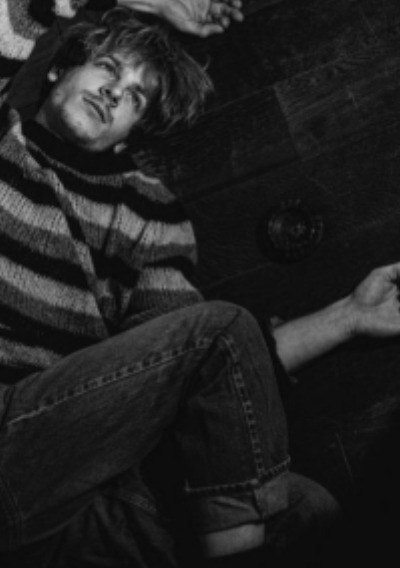
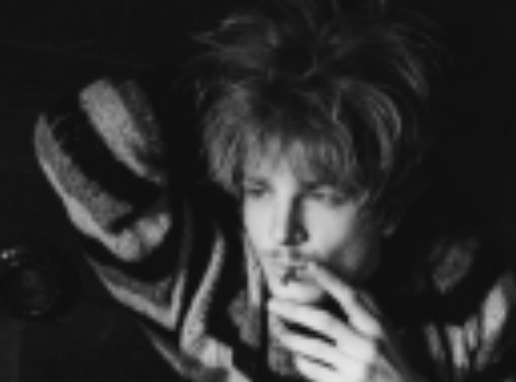
We start off with these two(sorry for blurryness, it just turned out like this when I cropped them). But funnily enough, I think we have Jure as the opposite of everyone else. Where the rest seemed to gain protection and safety from clothes, I feel like Jure feels stiffled by them.
In these two, he looks most lonely and disconnected than in any other photos from the photoshoot. In the first one, he is in a position akin to the one we saw him before, in that box. Like a cat lounging on the floor. But he is looking away, giving a picture a sense of loneliness, of disconnection. And even before we see him with a cigarette in picture two, there is an ash tray to indicate the smoking.
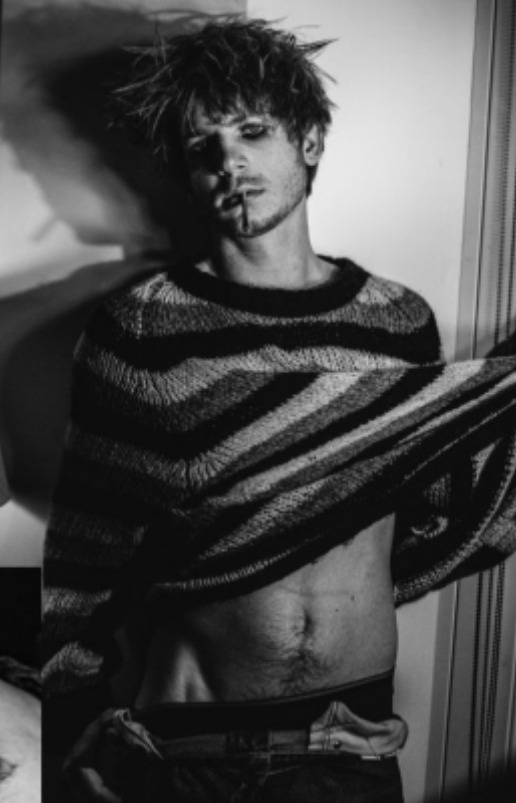
Then immediately following is this. Jure begins to take off his clothes, his pants and underwear pulled down messily, he is pulling his sweater up. He is still smoking here, but he is also looking directly at the camera. His eyes are frame by a dark eyeliner.
When I was looking at the pictures for the first time, I didn't get the connection until I saw this picture. I am gonna jump the gun and say that I think this set is literally meant to serve as a seduction. Who did they vote for the most likely to sleep with a fan? Jure. Who said hookup when everyone else said relationship? Jure again.
My interpretation is, as crude as it sounds, is that he is connecting with the viewer here through sex and seduction.

Here we have this again. He is only in his underwear and wearing a jacket. I'd even go as far to speculate that it's not meant to be his jacket. Because he is looking to feel closer to the person he is seducing. He'll put on makeup and their clothes, all for the show, all to be seen and to seduce. And I think that's what this photoshoot is, a way for Jure to be seen in a new light.
Interstingly, he seems to have mostly open body language so far in all pictures. In this one he seems slightly more closed off, with his knees pulled closer to his chest and his arm resting on top of them.
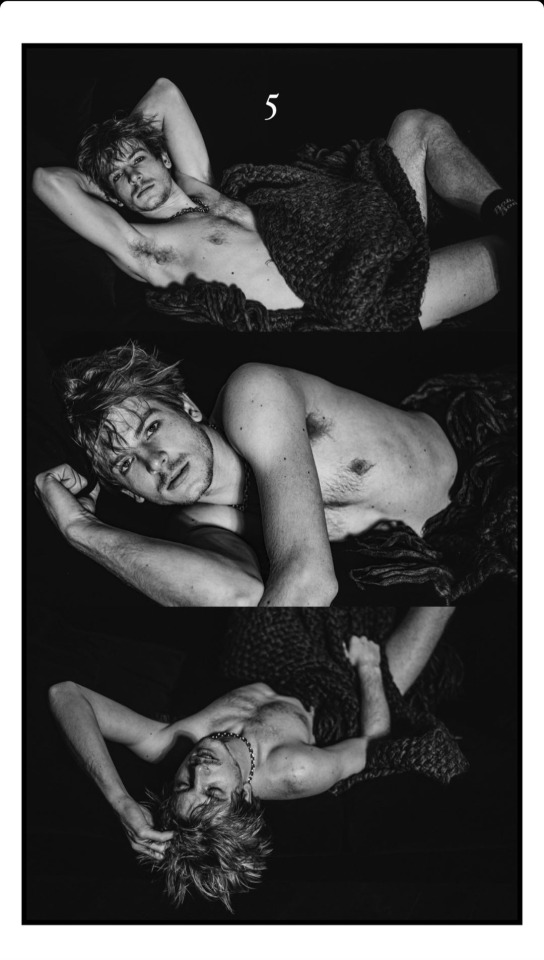
Then in this set, we have what I like to think of as "the morning after". There is no makeup, there is no clothes. Jure looks almost superior in the first picture. He reminds of Roman Emperor reclining.
Romans used to have parties, usually reserved only for men, where the position you got on the reclining bed could speak of your position. Here we have Jure alone, in the center. This is his moment and he is completely relaxed, completely in power. He isn't shying away from the camera, there is not shyness due to his almost naked state. Like someone would, after a suceesful seduction.
In the second picture, that's even more openly expressed. His head is fully turned to the camera, his eyes even more intense. It's as if he is inviting us in, drawing us closer. I can't tell if there is a different balnket altogether or if it's shifted and the end of it seems like a slightly different material.
Either way, I can't see anything but him pulling a lover closer once again.
Third picture is....well. Obviously there are certainly other interpretations, but to go with the obvious, Jure seems to be very open here, even has his eyes closed and that paired up with the way his body is positioned implies pleasure to me. Which once again plays into the whole set being about seduction, and about connection that he seems to gain from physical closeness.
In all three pictures, Jure is wearing a chain necklace around his neck. Interestingly enough, he doesn't wear them in the first set. Perhaps implying this is something new he decided to adorn himself with? Or a steel he wears underneath?
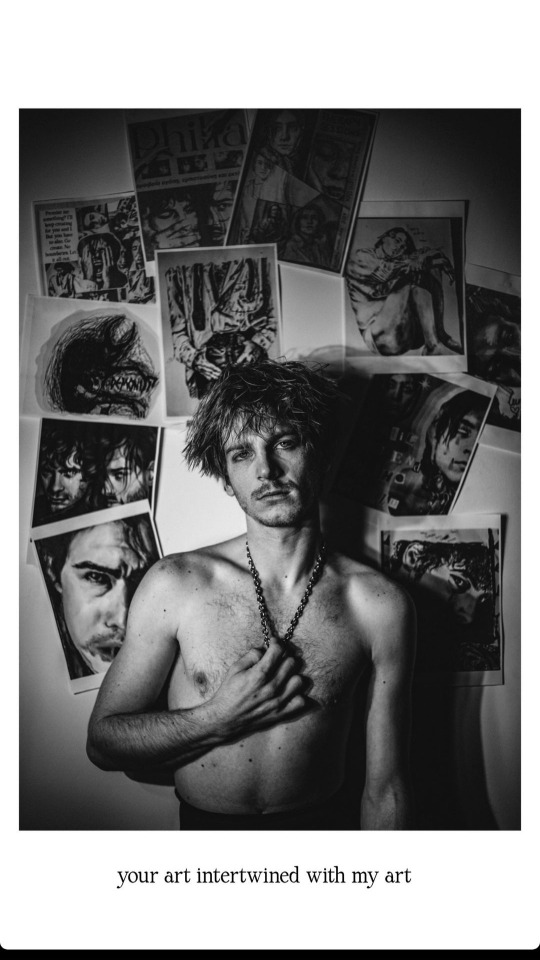
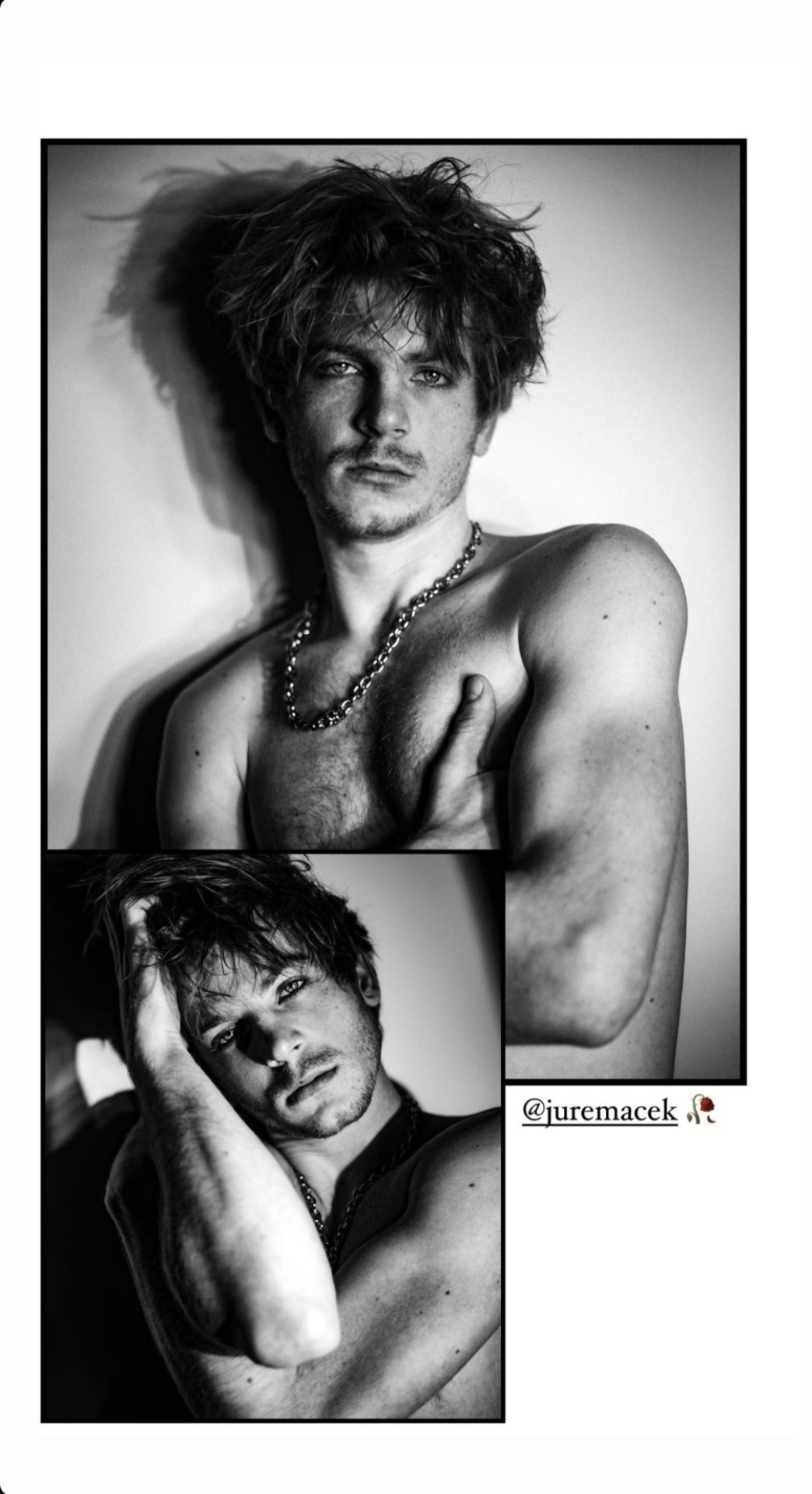
Then we have shirtless Jure, and an reappearance if a chain necklace. He is even openly acknowledging the necklace by touching it. With the addition of Damon's quote: "your art intertwined with my art", I think we can once again reaffirm this is a new way Jure wants to be seen. He is an art all of his own, even when surrouded by the art of the rest of his bandmates, he gets to be a central piece in this one. Yet-in the two pictures on the right, he has closed off body language.
Perhaps he is still unsure of the new role he wants. His gaze is softer, less intense. He is letting us take him in as he is. Which is clearly difficukt for him, hence mire closed off body language but none the less, he is still showing us that.
As always, feel free to add in on these, I feel like I missed on a lot of things bc of everything they dropped on us today but damn. I love this photoshoot sm
83 notes
·
View notes
Note
important subtext: Jeremy Brett smoked 60 cigarettes a day and went out of his way to break nonsmoking area rules to do it
Mr Brett what do you think you're confirming here
(I think this was about this post - sorry, my notifications don't work.)
Oh yes, absolutely! Another piece of important context is that Jeremy Brett left his first wife for a man, and was in a relationship with actor Gary Bond from 1969 to 1976.
Now, I do not think that you can necessarily say that because Jeremy was a queer man, he had to play a queer Holmes. But I am sure that -when he thought about whether or not he thought that Holmes was queer for himself - he came up with a better explanation than 'He and Watson couldn't kiss because of the smoking'. I mean, this man made up an elaborate headcanon about Holmes's childhood to understand how to play him. Personally, I think that he probably saw Holmes as too isolated and emotionally repressed to act on any feelings he might have had for anyone. He has this wonderful friendship with Watson who by some miracle (and lots of patience, I'm sure) just understands him, and who doesn't even marry in the Granada adaption. It is perfectly clear the are 'exclusive', in every way the viewer choses to interpret their relationship. They are together and they always will be. (Oh no, now I'm thinking of the Lost Beekeeping Footage again ...)
I also think that Jeremy often was uncomfortable because he felt Holmes and he were very different and he struggled to get him 'right', and at the same time that Holmes was coming too 'close' and took over too much of Jeremy. I think there is a possibility that Jeremy deliberately tried to separate his own experiences and feelings from what he believed Holmes to have experienced and felt.
When he made that reply about the pipe, I think it is relatively certain he came up with that on the spot. It is clear that he could not have said 'Yes, I think Holmes and Watson are gay' without causing a massive scandal which would not only have meant trouble for Granada, but also journalists digging through his private life. In that light, it was possibly even brave to say "I think it's unlikely" and "If it cheers the gays up I'm thrilled". I think it was possibly necessary to frame it as a joke, first by citing David's "Well, we're not" and then by coming up with that stuff about smoking.
But it does look a bit suspicious from a man who has been chainsmoking throughout the whole interview, I agree. ;)
#uhm sorry that was a long reply to a lighthearted ask#yes I have been thinking about this#jeremy brett#sherlock holmes#granada holmes#queer sherlock holmes#gay sherlock holmes#st. louis interview#unnecessarily handsome#asexual falling hard for actors from an 80s show#dr watson#holmes/watson
70 notes
·
View notes
Text
x novelization by tim waggoner thoughts below:
okay the interesting thing about the x novelization is that by virtue of writing a novelization, there is some editorializing of the movie by the author (because it’s like a translation of the story into a different medium which necessitates interpreting what’s happening in the movie for the reader — which may be a different interpretation than what the reader would’ve had as a viewer of the movie) and more of the characters’ thoughts/internal monologue. so i think the author actually does a pretty good job of capturing the tone of the characters’ voices even in the third person limited narration through each character’s perspective. but it also results in different impressions of the characters between page and screen in a way that sometimes feels questionable. for example, the author writes lorraine’s worry about rj’s disappearance as both being worried that she hurt his feelings (explicitly stated by her dialogue in the movie) + thinking immediately that she made a mistake by doing a scene in the movie they’re making (NOT necessarily the part she has regrets about, sort of antithetical to her character arc in the movie, retroactively negates her moment of asserting her agency). there’s so much more focus on rj’s feelings about the scene than hers also, and he even writes bobby-lynne as feeling bad for him in her internal monologue lol like she would NOT feel bad for his crybaby ass imo and she certainly never expresses as much in the movie. and that interpretation of that scene and that character and how much more empathy he writes for rj….. idk reading that was like OH i think we experienced that part of the movie very differently and i do think those differences are very gendered
i also think part of what makes the x novelization and maxxxine tricky is that maxine is a hard character to pin down in terms of characterization, she doesn’t have a strong distinctive personality, she actually doesn’t have that much dialogue, and her defining characteristic is something that is by nature not definable — “x factor.” much of why her character works in x is because of how mia goth plays her. when we start to get more of her internal monologue as this author writes it, it often becomes much more hokey than what’s happening in the movie lol. there’s a part that made me really truly roll my eyes where, right after maxine wakes up and realizes pearl is in her bed touching her, she does some coke and goes to find the others. this guy writes that she thinks to herself “popeye has his spinach, i have my coke.” like hello??? shut the fuck up. why would she be thinking that right after experiencing a complete violation of personal boundaries lmao. even down to very simple details added for more “texture” their characterization like i love the detail that maxine loves hot summer weather, that totally fits with her personality to me, but then he writes that she only smokes before going onstage or filming a scene (really? why?) and she loves laying in bed listening to thunderstorms (okay that’s a common thing that people enjoy but doesn’t seem like something she’d particularly love more than anything else in the world? i guess? idk it just seems kind of shoehorned in there for no reason other than to be like see? we’re adding depth to these characters artificially! lol). even like attributing the part where she’s exploring the farm to her calming her mind before filming is like. she’s not nervous though? idk i have different thoughts about what that scene could be meant to show about her character (beyond just for foreshadowing the gator attack lol) but i think part of her “x factor” is this easy confidence and comfort in her own body that she has, and i don’t feel like that part of the movie is meant to undermine that by making her nervous? obviously she gets rattled by pearl throughout the movie but she always stays fairly levelheaded. anyway this is getting so nitpicky but like the cumulative effect to me is just being like. okay our interpretations of how this character thinks and navigates the world is different
also though i think his writing for pearl and howard is sooo excellent, especially deepening pearl’s motivations and feelings. i think it’s a lot easier to read about her than to watch her in the movie actually lol probably also because my least favorite part of the viewing experience is the old person makeup to be so honest it doesn’t really work for me. but also because this author will also be writing the pearl novelization and readers know the plot of that movie now, i feel like he did a good job of incorporating some of her characterization in pearl into her characterization in x. i think that’s probably the strongest aspect of the book. i also think his descriptions of the action in the story are really well done, and the pacing translates well, and with the exception of those moments of lorraine and maxine that i already talked about, i think the tone of the book/the characters’ internal voices are matched well to the movie while bringing forward the pathos of the story. it’s a quick read and i did enjoy it so i’m not trying to totally bash it, and in fact i do plan on reading both pearl and maxxxine — i actually think i will enjoy the book version of maxxxine more than the movie based on my experience watching that movie and reading this book. i am a little bit more skeptical about pearl simply because i do love that movie but i like how he wrote pearl here so i am optimistic. as always though it’s just interesting to see movie vs book
7 notes
·
View notes
Text
Taman-taman (Park) (2024) Review
Director: So Yo-hen
Runtime: 101 minutes
Language: Indonesian and Javanese audio; Mandarin (繁體) and English subtitles
Certification: PG13 (Singapore; smoking scenes)
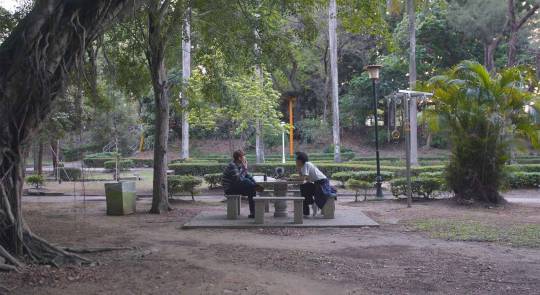
Via SGIFF.com
Can Taman-taman (Park) be considered a documentary? The film seemed like one to me as I watched it. But there were some elements that felt contrived. Still, it won three prizes at the 14th Taiwan International Documentary Festival (TIDF) earlier this year. “The Grand Prize of the Asian Vision Competition goes to a more or less non-fiction film,” says the jury comments. I like that description: “more or less non-fiction”.
Well then, it’s a documentary talking about the experiences of Indonesian migrants in Taiwan. I say “talking” because that’s what the bulk of the film depicts: two Indonesian men, Asri and Hans, having conversations in Tainan Park. It’s mostly through their conversations and through poetry rather than visuals that we learn about what they and fellow migrants experience.
Asri contributes much of the poetry presented in Taman-taman, including a poem about a worker who picks up his girlfriend on an electric scooter. We do get to see Indonesian scooter enthusiasts hanging out in the park, and a group—either the same one or another—singing together, but other than these, we don’t observe the discussed events. Though using this elliptical technique can make the audience feel detached, it means the film avoids exploitation of the subjects’ struggles for the sake of drama, a risk of documentary filmmaking.
Speaking of the scooter enthusiasts, they appear in one of those parts that feels contrived. Because it is. After Asri and Hans talk about the scooterists, they get up from a table and walk through the park. Scooterists soon circle around them in a neat line, and the two carry on as if nothing’s unusual. In a Q&A session at the 35th Singapore International Film Festival (SGIFF35), director So Yo-hen said that the first time they shot this scene, some scooterists did appear but not as many. After the filmmakers got more scooterists, Asri and Hans repeated the scene.
I’m guessing the decision to recreate the scene this way was to maintain viewer interest. I recall hearing light laughter from the audience at this moment.

But I wonder if there’s some other reason for the fictional elements in the film. For example, the radio station that Asri and Hans pretend to run, inspired by stones with embedded speakers found around the park. The two sit in a guard hut when they “host” their radio show. With its bright red lightbulb acting like an on-air sign, the hut does look as if it could be a studio. Hans blends Indonesian and Mandarin to come up with the name Ini Radio Yinni, meaning “This is Radio Indonesia”. The concept of the programme is to share stories of Indonesian migrants in Taiwan, accompanied by readings of poetry inspired by these experiences.
In a Facebook post from May, Asri says that the Taman-taman “film project sought to give voice to the experiences of migrant workers in Taiwan, with all the ups and downs of their lives”. So why blend fiction and reality? Why not use non-fiction material only? Why do we mainly hear about the experiences of migrant workers through Asri and Hans, and not through the people they speak about as well?
According to a bio provided by the 12th Momentum biennale, So Yo-hen and his filmmaking group Your Bros. “take filmmaking as a method to re-interpret reality.” In film critic Jason Tan Liwag’s review of Dorm (2021), a previous work by the group, he states that “documentary is not reality itself, but a reflection, refraction, and reconstruction of an accumulation of experiences.” Maybe this is what Your Bros. are trying to get the audience to remember.

Throughout Taman-taman, the filmmakers remind us that what we see is through their lenses. The opening scene directly shows us one crew member who’s helping to set up the shot. We also hear a voice telling Asri and Hans, who describe their roles in the film as “actors”, that they can start. Each time Ini Radio Yinni “airs”, the hosts tell listeners not to worry if they see people filming in Tainan Park, because the film might not actually be made. In the last scene that Asri appears in, there’s crew members onscreen again—well, the shadows of them and their filmmaking equipment are onscreen, all following Asri.
After my first watch, I thought it was unlikely that I’d write a full-length review of Taman-taman. I related to Asri during a scene in which he and Hans discuss their thoughts on the project so far. Asri says he’s tired of filming and doesn’t even understand what message the filmmakers are trying to convey. I couldn’t see where the film was going and was getting bored. On the other hand, Hans seems satisfied with the idea of letting the audience come up with their own ideas and says that the more he works on this project, the more interested he gets.
In the process of writing this review, I realised Taman-taman is more intriguing than I originally thought. I still relate more to Asri’s confusion than to Hans’ playful curiosity, though.
Rating: 3.5/5
Thank you to SGIFF for the Cinephile Pass and for the screenings of Taman-taman.
#film review#movie review#film criticism#sgiff#sgiff35#35th singapore international film festival#taman-taman (park)#taman-taman#公園#taiwanese cinema#taiwanese film#documentary#docufiction#so yo-hen#蘇育賢#your bros. filmmaking group#你哥影視社
3 notes
·
View notes
Text
Microanalyzing MeMe
Taken from the FOOL's MATE research doc.
This includes theories and thoughts from a bunch of different people.
I will be separating some things into Trikoto and Twokoto variants.
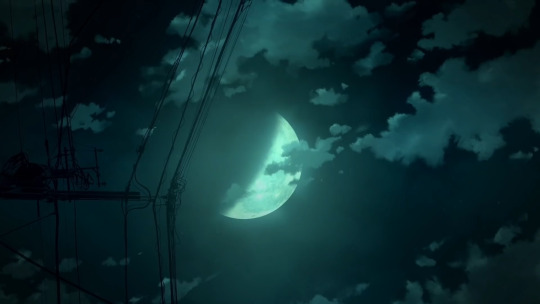
The moon is in its First Quarter. It’s halfway between the New Moon, which represents the beginning of a new journey, and the Full Moon, which represents the end of something or rebirth. And thus, it can represent a difficult time where decisions must be made and a point where strength of will is necessary. This could seen as John making decisions with Mikoto being left in the dark. That would explain why the moon only shows up in relation to John.

This scene could represent how their future is scattered, uncertain and messy as tarot cards tell the future.
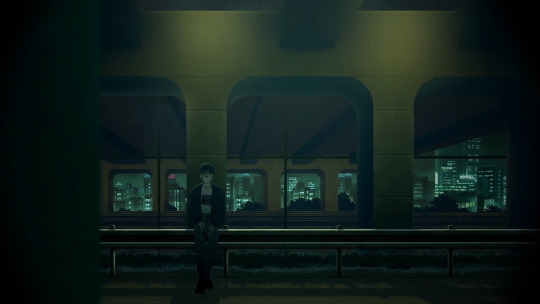
Throughout the murder, he is wearing a beanie, as if to conceal his identity from the viewer.
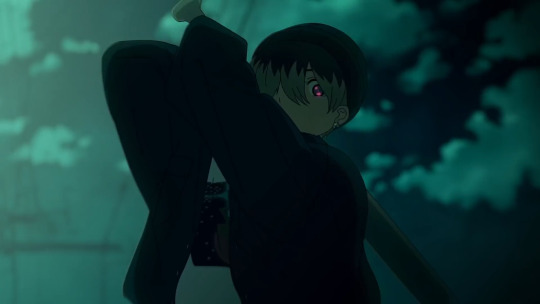
Trikoto: These scenes are mainly green, his eye is red and the bulk of the eye shine on the bottom. I see this as John and Midokoto working together in some way shape or form to kill someone. John would be the one to kill someone and Mido would be the one to deal with the aftermath. They are working together to keep this from Mikoto. Another thing that contributes to this theory is that only one eye is ever shown.
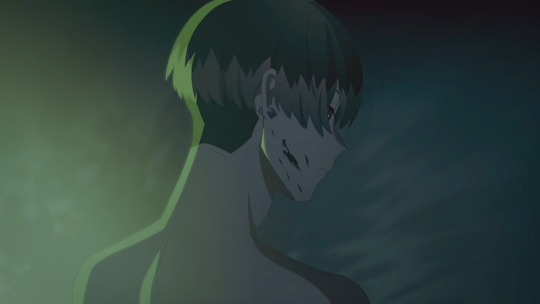
Trikoto: So going off of that, this scene would be Midokoto doing his part of the job and handling the cleaning up.
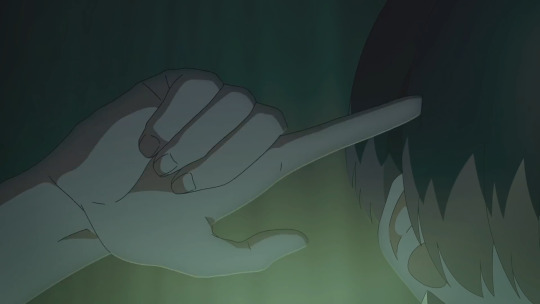
Trikoto: He points at his head 3 times. As if signaling to the viewer that there are 3 of them. When the scene swirls out, it has an RGB filter over it. Each color is associated with an alter. Blue for Mikoto, red for John and green for Midokoto. Bundled with the line that plays during this scene (Switch, Shake up that brain), it seems that this is referencing Mikoto, John and Midokoto.
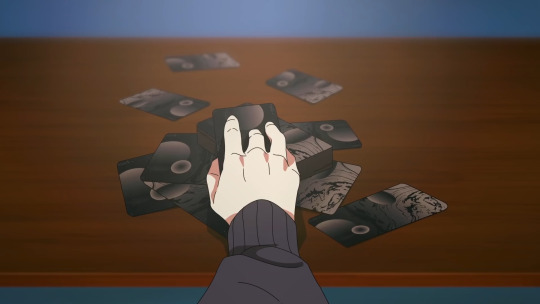
Mikoto wakes up in his inner world confused. There are tarot cards scattered on the table, so he takes one. We then see 3 shots of tarot cards. Each shot contains the same 10 cards in the same positions except the 3rd where 3 are moved. It then jumps to the Devil card before his actual card is revealed to be a blank card.
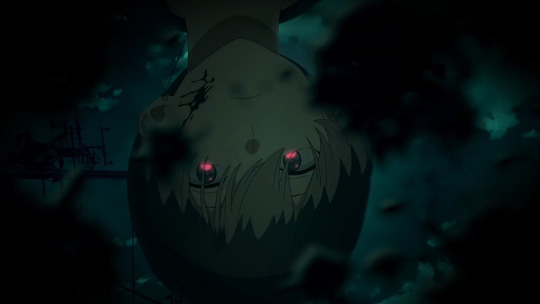
Back to the murder, we see John looking over something, possibly his victim. He could also be burying him but, given that there's a phone pole in the background. I don't think that's what's happening here.
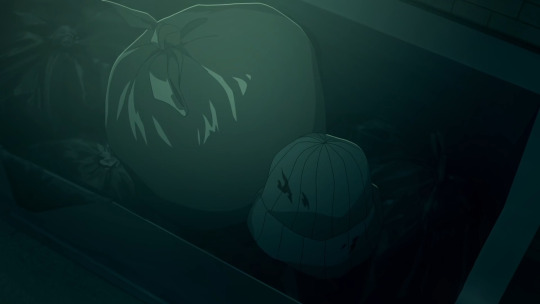
John or Mido puts the body or other evidence in a trash bag and throws it into a dumpster. Their sloppy work makes me think this is the first murder. They also throw the beanie away. Both of these shots show that he is not a calculated killer as the murder was very sloppy. He threw away trash in an area where illegal dumping would be reported and he left DNA evidence. I also don’t think that the bat is in the bag. It’s likely just the body and his jacket.
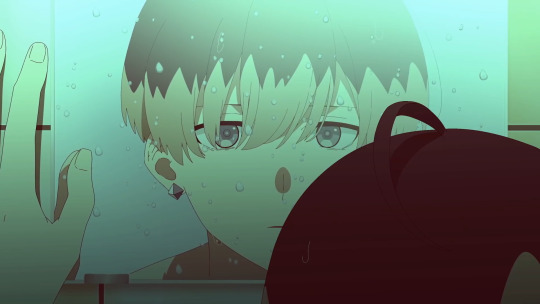
In this scene, it seems that Mikoto could be dissociating.

In the mirror in the real world, you see Mikoto looking around confused and concerned. In the inner world, John is in the mirror. This shows that John has now fronted. Maybe Mikoto knows that somethings up. There’s also a chance that these shots aren’t sequential. This and the next scenes could also be him realizing that the person ruining his life is both not him and him at the same time.
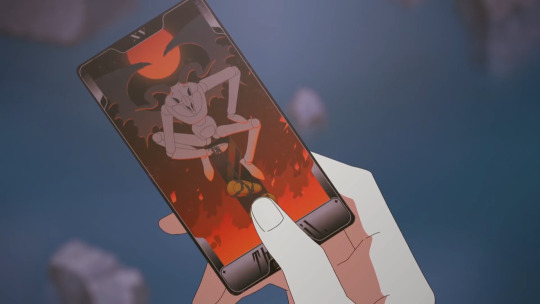
Mikoto is startled by this. He then falls and is given a card. He receives The Devil card without having a choice while he's fallen down in a vulnerable position. The card then turns black. He drops it and the room turns red.
He panics and John/Mido appears behind him with his hands in the shape of a gun to his head as if to threaten him.

The surveillance footage can be interpreted as the altars watching Mikoto. Mikoto is stressed. He has likely come from work.
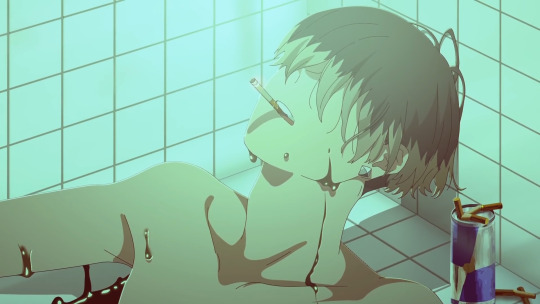
Trikoto: This could be Midokoto dealing with the aftermath of another murder since he’s smoking real cigarettes.
Twokoto: Some people say that this scene is a suicide attempt. Personally, I’m hesitant about that. The shower and mirror scenes often are paired with the last as well as the suicide atempt theory. In this theory, he’s losing consciousness in the scene on the right.
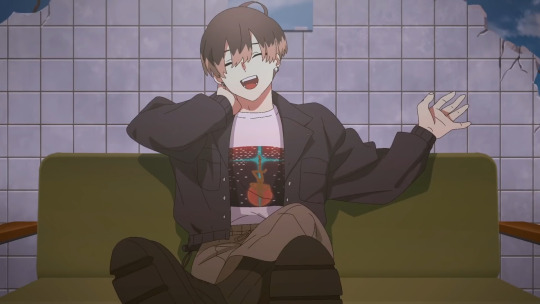
Mikoto is addressing the audience/Es.
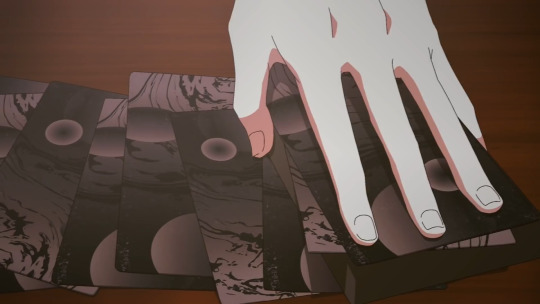
Here, he’s stacking the deck up neatly. He's trying to take control of his own destiny. Control of his life is very important to Mikoto. Or, he’s shuffling his deck to properly understand what is going on.
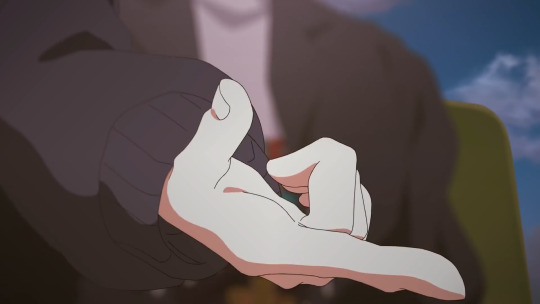
He snaps then the room turns red. Mikoto has now fronted and John is back in the inner world. This could also symbolize a switch.
Trikoto: We don't see his head in this shot so this could be Mido.

John draws a card and shows it to the audience as if to say it's not his. His expression goes from cheery to cold.
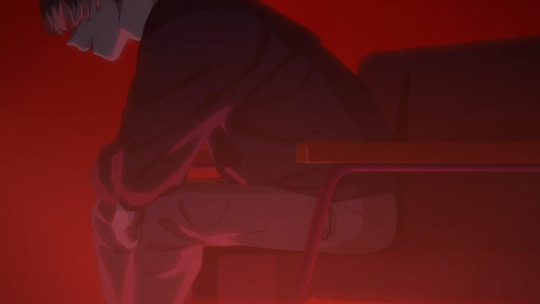
John is seems to be having a conversation with someone within the inner world. He then draws 8 more tarot cards and the conversation continues.
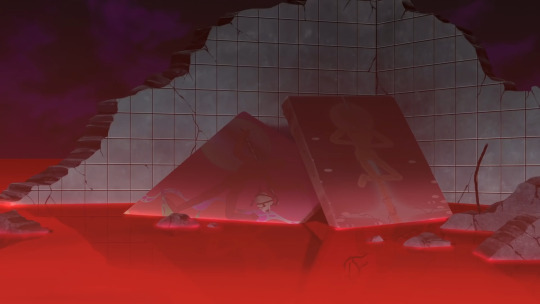
The paintings in the corner of the room are shown. These are not a part of the spread. The chair is then shown again.
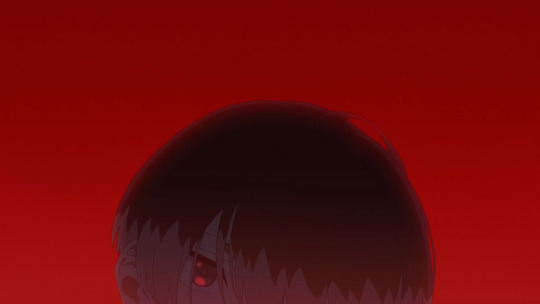
Trikoto: This is possibly Midokoto as his hair is covering one eye.
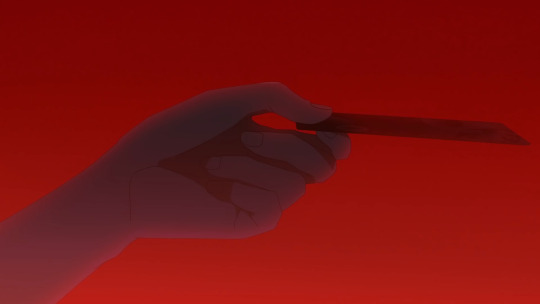
John hands someone a card and puts in on the table.
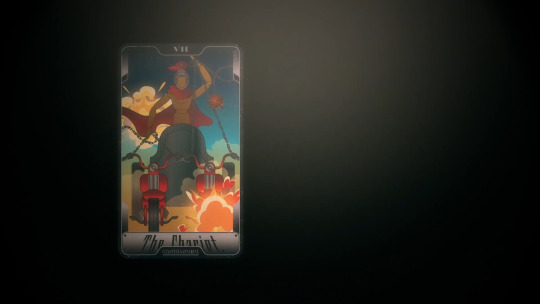
The next card to appear is The Chariot. The Chariot card is interesting. Mainly the bikes. One of them is fine, the other is exploding. These bikes could represent Mikoto and John in relation to John’s actions. The mannequin has direct control over one of them. But the other is exploding and the mannequin has a mace in the same hand that shares the chains connected to that bike. John just wants to protect him, but he does so in a harmful way and it destroys the control Mikoto wants to have over his life.
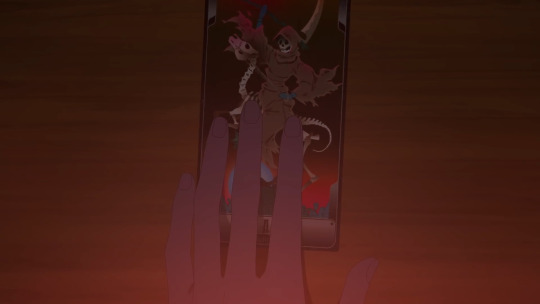
The last card he puts down is Death.
Trikoto: The Kayano that is receiving the card isn’t wearing a jacket. This could very likely be Midokoto.
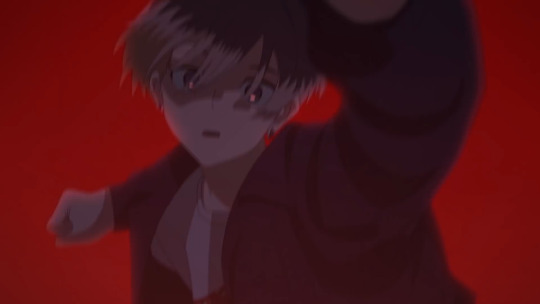
During the last scene, “John” suddenly looks surprised. I see this as Mikoto either fronting for a few seconds or somehow seeing what John is doing.
The fourth wall being broken at the end shows that the MILGRAM system may have found something that isn’t a memory, but a conversation between John and Mikoto or Midokoto in the inner world.
This entire MV is very out of order. Here is the order I think the events happen in.
Trikoto
Timeline 1 (John/Midokoto)
Mikoto comes home from work and has a breakdown because of the stress.
John goes to Midokoto and proposes a plan to get some stress off of Mikoto.
John kills someone with Mido watching.
Mido cleans up and deals with the aftermath.
Timeline 2 (Mikoto/John)
Mikoto wakes up in his inner world and does not know what's going on.
He eventually encounters John after he has killed someone.
Mido quickly has Mikoto front to avoid any type of confrontation.
Twokoto
Timeline 1 (John)
Mikoto comes home from work and has a breakdown because of the stress.
John kills someone.
He then cleans up the aftermath.
Timeline 2 (Mikoto)
Mikoto wakes up in his inner world and does not know what's going on.
He eventually encounters John after he has killed someone.
Mikoto then fronts, leaving John alone in the inner world.
Other Details
Framing of the events of the murders as a horror movie speaks to how Mikoto views his actions.
MeMe takes advantage of the assumption that there is one Kayano.
MeMe is generally told from Mikoto’s POV.
John is portrayed as scary and evil because that's what Mikoto assumes is happening.
#milgram#ミルグラム#john kayano#mikoto kayano#milgram project#milgram theory#milgram analysis#midokoto#fools mate research#kayano mikoto#kayano john
11 notes
·
View notes
Text
Contradictions
As some of us guessed, it seems the play has a handful of contradicting information. The same kind of contradictions you see when the novels and comics. Stuff that directly conflicts with the show itself.
What makes this more frustrating is the show runners insist this is canon despite the contradictions, so once again, I think the only thing one can do is take SOME of the information as useful and the rest of it as being dramatic for entertainment sakes.
Once again, my thoughts will be below a read more because of spoilers.
Contradiction #1: Henry's Coma
Apparently in the play, Henry does not go into a coma after killing his family......... he goes to school the next day or something. All for the purpose of allowing Joyce to confront him and say Victor Creel did all of it.
Why was that necessary? There could've been a scene of Joyce saying it was Victor Creel's doing without needing Henry to come to school after what just happened???
So pointless. I think Henry being kidnapped by Brenner and Victor being accused of killing both of his kids and his wife is pretty important to what they set up in the show. Why contradict that?
Contradiction #2: Communication through the void
Apparently in the show, Henry can willy nilly just speak to people through the void whenever he wants.
Either this is a direct contradiction to El's experience in the void or it's just something Henry can do since we've seen him easily mess with peoples heads and whatnot.
El has only communicated with someone through the void 3 times. Once with Will when he was in the Upside Down. Once with Terry who also has powers. Lastly, once with Billy when he was possessed by the Mind Flayer.
There have been plenty of instances where she's in the void and no one can hear her no matter how much she speaks or yells.
Contradiction #3: Henry's already been to the Upside Down
A friendly anon sent me a message related to this, but apparently it isn't the Upside Down that gave Henry powers, he already had them by the time he got there. I guess due to the run away scientist's machine? I dunno.
It's a bit of a relief to hear that. But this presents another problem. Henry has already been to the Upside Down. It's not "somewhere new". All it does is confirm El didn't create Dimension X. Still don't know how to feel about this.
Contradiction #4: Barely any symptoms of possession
Apparently they made it pretty clear in the play that Henry was possessed by the Mind Flayer in much the same way Will was. Through special effects, they show the Mind Flayer entering Will much the same way it did to Will in season 2.
I don't know if this is the viewer's interpretation or the play said it, but Henry liked to be in the attic because "it's cold". But.... usually the attic is one of the warmest places in the house. Heat travels up out the main house and into the attic. Depending on the attic, it can get really hot actually. Henry hanging out in the attic "because it's cold" makes no sense. I guess if the play is taking place in the fall or winter and the attic is not insulated whatsoever, THEN it would be closer to the temperature outside than the temperature in the house, making it cooler than the house?
I don't mind recentering the Mind Flayer as the main baddie, but making this a direct possession is just... an odd choice imo.
I would expect the show to have depicted things way differently if this was all just a possession story line.
Contradiction #5: No gates, but still alive?
Something that totally slipped my mind. When no gates are open, the Mind Flayer is completely cut off from the real world and everything it is in possession of dies.
If Henry was possessed and no gates are open, how is he still alive? How can the Mind Flayer communicate/influence him?
I suppose the show contradicts this itself a bit with the Demogorgons, Demodogs, and the Mind Flayer smoke being alive and well all the way in Russia without a gate.
Conclusion
So far, here is what I will be ignoring and what I will be accepting in my world view of Stranger Things. Keyword "my". If you're reading this, you're free to believe and accept whatever you want, I'm not telling you what to do. Just wanted to make that crystal clear, sometimes I feel like people think I'm speaking as some kind of authority and they couldn't be more wrong. Lol
#1: Henry does not go to school after killing his family. He is kidnapped and kept secret by Brenner, just like the show depicts.
#2: Only Henry can easily communicate with anyone through the void because of his telepathic mastery displayed in season 4. If he can give people waking nightmares, then he can have conversations with them too.
#3: Unless the show is going to show more, I choose to believe Henry was not fully possessed like Will or the rest of the Flayed. But some secret third option. My brain will decide what that secret third option is later.
#4: I guess I can accept the blood transfusion thing. But, I also want to acknowledge that I still think powers exist naturally in the world, it just takes a lot to make it happen and they might not be very strong. So, I'm thinking a combination of natural aptitude, MKUltra and Henry's blood is what made El is the person she is today.
My opinions will likely still be changing, but this is where I am for now.
11 notes
·
View notes
Text
Catalog Essay, Dennis Lee Mitchell: "Poetry of Smoke" at Zolla/Lieberman Gallery

Dennis Lee Mitchell, "Nebulae Series 41", 2024, smoke on paper, 23¾ x 23¾ in. (framed)
The funny thing about the smoke in Dennis Lee Mitchell's drawings is that it doesn’t seem hot. Instead, the sooty tones and marks are rather cool and calming. The undulating saturation of the gestures resembles the flow of water, the matter gathering at or dissipating from the fine edge of his forms, like the dried-up borders of a stain. In this light, his many radial compositions can feel like so many tiny waves rippling from a disturbance at the center. It seems almost absurd for a medium such as smoke to suggest the character of water, the two ideas so ensconced in our consciousnesses as inherently opposite. But, it's the completely novel character of Mitchell's drawings that allow for such varied interpretation of the viewing experience. This is a process that is relatively unusual, so unique to the artist that a viewer has very little to draw upon to place it within our typical understanding of works on paper.
Yet, there is an urge in a viewer to name or categorize Mitchell's forms. While the artist is able to anticipate how the gestures he makes with his torch might settle upon the papers’ fibers, the drawings are intuitive and abstract. It's our own pareidolia that strives for recognition, that locates imagery within pattern, like the derivation of meaning from an ink blot test. Mitchell is not drawing pictures of anything in particular, rather he's making space for the inherent properties of the medium to do what they do. In works like his “Portugal Series,” an astounding degree of illusionistic space is created through Mitchell's layering of smoke, the ebbs and flows of the soot resembling the highlights and shadows that light casts upon a form.
Insomuch as Mitchell's works capture the remarkable aesthetic potential of smoke, so too are these drawings a testament to the poetry of its science. The drawings’ radial compositions are not truly symmetrical, but oftentimes seem close to it. And, Mitchell's affinity for this shape results in multiples, the repetition reinforcing the subtle differences among the pieces. The ghostly halos in the first of his “Nebula Series” are that much more fragile compared to the finite edges of the second, while the both of them are so airy and ephemeral in the presence of No. 4 --a spotlight in the darkness in comparison. Like snowflakes or fingerprints, these differences underscore the impossibility of true sameness in the natural world.
The significance of Mitchell's smoke drawings also derives from their indexical nature, in the physical presence of the matter that makes up the works’ meaning: the transformative power of fire. In several of Mitchell's newest works, the introduction of a wider range of color reinforces the phenomenal. Applying heating additives to the flame of his torch, the artist harnesses these chemical reactions into billowing, all-over abstractions. There's a kind of logical magic to these, with a heightened awareness of the process. Between the combustion of the fuel and the additives, and the finished product, lies that at which Mitchell bids us to wonder: that fleeting moment wherein soot is airborne, a sublime state rendered through an extraordinary footprint on paper.
Robin Dluzen Artist & Art Critic 2024
1 note
·
View note
Text
Yu Yu Hakusho review episode 1
been watching the new live action series and so far my impression is that they're trying to pull off what the live action One Piece did, but in my opinion not with the same success
I think where One Piece succeeded is that even though they trimmed A LOT from the original; they kept all the important emotional moments: Zoro's promise to Kuina and Zeff's sacrifice for Sanji were nearly point for point as they were in the manga. Usopp's relationship with Kaya and Nami's with her sister and her village are changed, but the character development and emotional moments still hit the same, or similar enough to please long-time fans and hook in new viewers.
Yu Yu Hakusho seems to want to skip these moments, or rather right TO these moments without the character development build up. Yusuke doesn't start the series as a horrible gremlin who has a well-earned reputation for mindless violence; he starts out as a misunderstood delinquent who gets blamed for bad things other people do.
It's subtle difference, since the original Yusuke actually did become a scapegoat for every crime that happened in his vicinity; BUT it's made clear that he also enjoys crime and violence without prompting and would still be "bad" if he was blamed only for the things he DID do. In the live action we do get a list of bad things he's done (from Heaven no less, so we know it's the things he actually did) but on screen we only see him get violent in self defense or defense of others. You get the feeling his bad boy persona is mostly crafted, rather than well earned. Keiko even says so out loud.
They also changed his mom (Atsuko) to be a lot more boring!
like I get it, in the original manga she got teenage pregnant at 14 or 15, which was meant to signal that she was a delinquent like her son. obviously by today's standards that's a Fucking Yikes but they could have kept her teenage pregnancy and delinquency, just change her to 17 or 18, you can still have her drop out of high school and be a bad girl
I get ZERO bad girl vibes from her in this version, she's just a single mom who smokes; it feels like a downgrade! her original version had ties with the yakuza and was perhaps a brothel madam (more than once she's mentioned to be extorting money from pimps)
maybe I was interpreting this, but I always thought Yusuke learned how to be a takes-no-shit badass from her; they're a pragmatic family to the extreme. in the manga when Yusuke dies, what he says about his mom is "she's still 29 and looks good, now she has a chance of getting a good man without a goddamn kid on her back" he expresses care and sentimentality for her that way! they're NOT a hugging family
it was SO WEIRD in this live action to see Atsuko gently caress her dead son's cheek. in the manga version, the reason she touched him after death was "to hit him upside the head one last time before his cremation" same motivation, very different approaches! in the manga we find out a lot about her personality by seeing her GET DRUNK at her son's funeral and yell at him for dying and being a pussy. She still cries and obviously she loves her son! but the way she shows this also tells us a lot about how she raised him
#it turns out I have a lot of feelings about Atsuko#yu yu hakusho#yu yu hakusho live action#fetus talks
0 notes
Text
HBO as well as the MMOexp Madden NFL 24 Films crew
The Cowboys will no longer bear the responsibility of extending support to a player that even with jail time could not keep him from breaking the law again Madden 24 Coins; regardless of how minor one may view smoking marijuana.
The actions of Brent could be interpreted as him owning up to the situation that his life is currently in and realizing the gravity of the situation he is facing. If the legal scenario turns to Brent's advantage the only thing he has to do is not retire. Brent's rights are held by the Dallas Cowboys and the league could then reconsider the possibility of suspension.
Hard Knocks series gets mult-year extension through MMOexp Madden NFL 24 Films, HBO
HBO as well as the MMOexp Madden NFL 24 Films crew have extended their partnership in relation to Hard Knocks, it was announced on Thursday. There was no information released about what the term of the deal is, but MMOexp Madden NFL 24 Films' Ross Ketover referred to the extension as an "multi-year renewal" and stated that they'd be available for "a few more years."
The deal isn't one that most MMOexp Madden NFL 24 teams are likely to love, considering Hard Knocks has had trouble getting teams to be part of the series, however, viewers seem to remain curious about what MMOexp Madden NFL 24 teams are willing to show on HBO.
This year's 16th MMOexp Madden NFL 24 Rookie Symposium will include guest speakers on the topic of sexual orientation as per Jane McManus of ESPN New York Buy Mut 24 Coins. This will be the first time that the league has people talking to rookies about the possible inclusion of homosexual players which is likely due to how many media coverage the subject has received recently.
0 notes
Text

"Smoke"
Watercolour and fineliner on A3 paper
The cyberpunk aesthetic, as well as Hiroto Ikeuchi headphones, were major influences. He develops futuristic headpieces that are heavily influenced by cyborgs and anime robots. I chose to create one of his designs since I believe his work sends a message that is comparable to mine. I chose to make the eyes lifeless since this allows the viewer to guess what the character in the painting is really feeling, leaving it up to their own interpretation.
0 notes
Text
Ok i have more thoughts about that.
Starring: Jason the dealer, Eli the cop, Landlord the landlord, Mirentxu the cop, and various silly characters.
First episode: apartment gets raided by the police. Turns out Eli had this done because he wanted to check out the place. The landlord is thinking he’s never getting clients again so he is okay with Eli moving in. Jason wonders whether to stop dealing or not.
Running gag of Jason hiding the weed everywhere possible.
Eli once eats an edible without knowing it but when he comes down Jason makes him think he had an allergic reaction to smthing.
Mirentxu, Eli’s best friend, is highly suspicious of Jason, she only approved the search because she thinks he’s dealing. Takes every opportunity in the condo to search for drugs.
Landlord is an artsy guy always doing some complicated projects. He lets his tenants pay a lower rent if they agree to star in his projects. Jason said yes a couple times but won’t do it anymore because the performances are exhausting and/or humiliating. The Landlord is not evil though. As far as a landlord can be.
Jason’s official job is making artisanal products like candles and stuff (“that’s why he always has a lighter on him”). He deals to help with rent and for the love of the craft idk it doesn’t have to be complicated.
“How do we make sure the audience doesn’t think of Eli as an asshole after the raid thing?” brother he’s a cop
Jason’s clients are recurring characters who all have a specific gig. Lana Long Ones, 3AM Jordy, Riley and the Reefers… Two of Jason’s uncles buy from him, one because he smokes, the other because he doesn’t know what it is (thinks it’s seeds) and just wanna be supportive of his nephew: the dude is growing cannabis in his backyard by accident.
Sexuality and gender identity of the characters are up to the viewer’s interpretation.
There are three weed-smoking girlfriends somewhere.
Last episode: weed is legalized in their state/country.
open to suggestions. @moonsworndandelion would you still watch that
My New Roommate Is a Cop And I’m a Weed Dealer: The Anime
7 notes
·
View notes
Text
Eddie Munson - Fluff Alphabet

Eddie Munson x Reader (only referred to as “you” throughout)
A/N: Fluff Alphabet today, Smut Alphabet tomorrow. Apologies if these have been done a million times before. I’m not really in the Stranger Things fandom scene on tumblr but I am a simp for Eddie and needed to do one of these for myself. This is how I see the character of Eddie, feel free to agree or disagree. Character interpretation is entirely up the viewer. This is my take. (and just because I’m posting some Eddie stuff doesn’t mean I’m still not Peter Parker trash/writing for him. i can do both.)

Activities - What do they like to do with their s/o? How do they spend their free time with them?
When Eddie is with you, he doesn’t want to do anything except be with you. That’s it. He doesn’t need the added stimuli to distract him. All he wants is you. He loves to kick his feet up, light a joint, and enjoy doing nothing but admiring you. He’s typically very hyperactive so, when he gets a moment to chill, he likes to cherish it.
He would love laying his head in your lap while he smokes. His eyes would close as you run your fingers through his hair and massage his scalp. He’d let out a little sigh of happiness with a lazy smile on his face. His fingers would entwine with yours. Eventually he’d start to doze off and you’d pluck the joint from between his lips before it falls out and stick it in your mouth instead.
Beauty - What do they admire about their s/o? What do they think is beautiful about them?
The man is all personality based. He falls in love with a person’s soul first. The more beautiful they are on the inside, the more beautiful they become on the outside. He doesn’t care what you look like, what crowds you run with, what you identify as, as long as he can connect with you.
Not many people outside of Eddie’s group of friend’s ever take the time to actually know him. All it would take is for you to show a little interest and he’d be head over heels in love with you. He’s also a sucker for shy smiles and bashful giggles in response to one of his jokes or over the top personality. He’d think everything you do is absolutely adorable and he’d melt into a pile of goo every time you laughed.
Comfort - How would they help their s/o when they feel down/have a panic attack etc.?
Eddie Munson would be the king of trying to fix all your problems. If you were upset, he would overdo it by trying to make you laugh. His first reaction would be to get you to smile again even if it’s through your tears.
His second reaction would be to take a step back, calm himself, and go into cuddle mode. He’d gather you in his arms and let you cry it out. When you were ready, he would sit and listen to you rant about whatever it was that upset you. If it was another person who made you upset, he would absolutely threaten to kill them for you. You both know he would never actually do that but, hearing him threaten it, is enough to get a giggle out of you anyway. “There’s that smile I love.” With a little kiss on the tip of your nose.
If you were having a panic attack, I don’t think he would know what to do if it was the first time he witnessed it. Mental health and anxiety wasn’t generally discussed in the 80’s (as far I know, I wasn’t alive then, but I can only assume). Things like anxiety were probably very stigmatized, especially in a small Indiana town. If you had anxiety, I guarantee it was something you tried to keep very quiet and hide from everyone else. Having a panic attack in front of Eddie, you’d be terrified that he was going to think you were insane or think less of you. While it was happening, he would be freaking out, not knowing what to do. I feel like he’d grab a brown paper bag and try to make you breathe into it or something. Once it passed, he would just sit there and hold you in silence.
“Don’t do that again. I thought you were dying.”
And then he’d reassure you that whatever you’re going through he won’t ever think less of you.
“I already think you’re a freak. A little psychotic break won’t change that.”
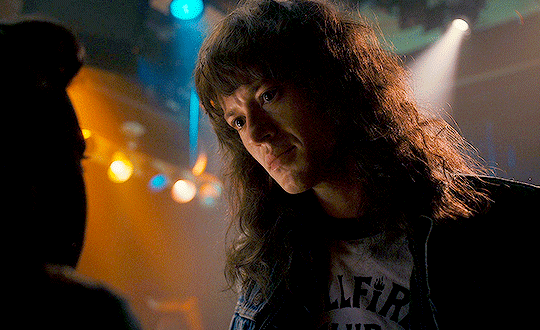
Date - What was the first date with them like? What is their go-to date? What is their dream date?
First date:
Eddie asked you out on a date but pretended that it wasn’t.
“Want to hang out tonight? We can go to Lover's Lake and get stoned? I won’t make you pay for the drugs. It’s on the house.”
Eddie never made you pay for drugs which should have been a huge sign that he was secretly in love with you but you were oblivious.
When you get to the lake side, the two of you sit up against a fallen log and stare out at the dark water. The moon light reflects off the water and casts an eerie, watery glow across his face. For the first time ever you really get a good look at him. You’ve looked at Eddie a million times before but never like this. You start to realize all the soft features of his face and how beautiful his eyes are. He catches you looking at him and you quickly turn away in embarrassment.
“This isn’t a date,” he quickly shouts to ease your panic.
“I know,” you reply. “No dates here. Just two friends hanging out. Nothing more.”
“Nope...nothing more. Just a couple of friends.”
The façade of two friends hanging out unravels at lightning speed and somehow you end up straddling his lap while you kiss under the stars. But it’s definitely not a date! ;)
Go-To Date:
The two of you really don’t go on dates. You more so hang out alone with each other with no hard set plans. Neither of you have money to go out to eat very often. Sometimes you might sneak in to see a movie but, really, it mostly consists of finding a spot away from watchful eyes and making out.
Dream Date:
Eddie dreams of dragging you along to every single metal concert that passes through.
Equal - Are they the dominant one in the relationship, or rather passive?
Passive. Eddie’s like a little puppy that follows you around and willingly does whatever you say. That’s not to say that he doesn’t have a mind of his own or pick things to do for the both of you, but, overall, he likes you to take control. He’s just happy to be there.
Flight - Would they be easy to forgive their s/o? How are they fighting?
Eddie can be very opinionated and has a tendency to get into arguments sometimes just for the sake of arguing. No one can push your buttons quite like Eddie Munson. When he’s annoyed he’ll often mock you or repeat the things that you’re saying in a snarky voice like a bratty child.
He’s very dramatic when he fights with you (imagine a lot of exaggerated hand gestures and pacing around) but never goes for the deep cuts. You’re very aware that he knows all your secrets and could easily play vicious if he wanted to hurt you but he never does. He doesn’t sink to that level. Usually.
The rare time he might cross a line, he immediately sees the look of hurt in your eyes and his entire temper dissipates in seconds and he instantly starts groveling for your forgiveness. He’s the kind of person who would get down on his knees in front of you and throw his arms around your waist, hiding his face in your stomach, as he apologizes.
On the opposite end, he’s easy to forgive and forget if you hurt him. He quickly tires of any drama and just wants things to go back to normal as quickly as possible. He’s a lover not a fighter.

Gratitude - How grateful are they in general? Are they aware of what their s/o is doing for them?
He’s not shy about showering you with compliments and praise. He thinks it’s really cool that you’re willing to stay up late with him while he plans his next big DnD campaign. He loves when you sit in the garage and watch his band play. He likes showing off for you and knows that not a lot of people would willingly put up with “the freak” and his antics so he takes the time to express his thanks through kisses and shared smiles from across the room.
Honesty - Do they have secrets they hide from their s/o? Or do they share everything?
Eddie tends to be very open and honest about most parts of his life apart from his feelings. He keeps those very guarded. It took him long enough to admit that he liked you and that’s what he considers a “good” emotion.
The “bad” emotions are well guarded. He doesn’t want to feel weak or be a burden if he admits that he’s struggling.
He hides those feelings by throwing himself into fantasy worlds. You can always tell when something is wrong based on how grounded in reality he is. If he’s done nothing but talk about DnD for the past week or had his nose lost in a Lord of the Rings book every time you see him then you know something is up. He’s trying to hide away in far off lands.
Even if you prod for information, he’ll only sink further away and stand his ground that he’s perfectly fine. Usually what it will take is dropping the subject, taking him for a long walk late at night (one where he complains that he’s tired the whole time), and finally finding a quiet spot where you can break out some cigarettes and cheap beer, indulge in the vices, and eventually his walls will start to break down. Those nights often end in him quietly crying in your lap while you gently stroke his hair. He’ll let it all out and then pretend like it never happened the next morning.
Inspiration - Did their s/o change them somehow, or the other way around?
Like most relationships, each person changes the other in some way. It doesn’t have to be huge or mind opening. It could be something as little as gaining a new music interest or picking up a few new phrases you never used to say before. Sometimes you find that the facial expressions you make are now freakishly similar to Eddie. Sometimes he finds that he’s eating fries dipped in his milkshake more than he ever has before because he knows it’s your favorite combination. It’s the little things that subtly change a person that stick with you the most.
Jealousy - Do they get jealous easily? How do they deal with it?
He’s a secret jealous type. He’s very observant and notices little things that you might not even pick up on.
He’ll silently stew in jealousy from across the room while the guy at the cash register flirts with you as you order food. When you return back to him, he’ll be silent and huffy until you finally give in and ask why he has a giant stick up his ass. Eddie will snarkily reply that the asshole at the counter was flirting with you and was staring at your butt as you walked away. It’ll only make you roll your eyes, grab his hand, and drag him over to a table as a silent way to tell him to shut up and stop being dramatic.
Neither of you take the jealousy very seriously though.
Kiss - What was the first kiss like?
Shaky. Nervous. Overly excited.
I am fully under the impression that Eddie Munson has never kissed someone in his life. His heart would be racing, his breath labored, and his eyes wide with a nervous excitement. He’d have no idea what to do with his hands, he wouldn’t know if it would be okay to touch you, so he’d just leave them awkwardly hanging at his side until you grab his wrists and place them on your hips.
Given the okay to touch you, he’d quickly pull you closer to him and wrap you up in his arms as you kissed.
Immediately after he’d ask how he did. When you say it was very nice, he’ll ask if he can do that again. The answer is always yes.
Love Confession - How would they confess to their s/o?
He’d know he loved you long before he ever said it. He’d become obsessed with wanting to tell you but terrified of actually saying it out loud so he just silently screams it in his head for a bit.
It finally comes out in the most nonchalant way by accident. It’s when you stop by one afternoon with a bag full of junk food. He looks through it, noticing all his favorite munchies, and gives you a big smile and passively says, “This is great. All my favorites. Fuck, I love you.” You both freeze at the confession. His cheeks turn red, takes a quick second to think about it, and then he shrugs, “It’s true though. I do love you…like…a lot…”
With a quick peck on his lips, you whisper back, “I love you too, Eddie.”
“....Wait, what? Really?”
You have to laugh at his shock and roll your eyes, “Yes, Eddie. I love you. Shocker, I know.”
“Whoa. That’s metal as fuck.”

Marriage - Do they want to get married? How do they propose?
I can’t see Eddie as the marriage type. I think he has a bad perception of marriage. He’d be terrified that if he ever married you then you two would be destined to eventually despise each other. Every adult he knows who is married hates each other and he never wants that to be you two. You’re fine with not pushing it. Marriage isn’t on your list of life goals either. As long as you can be with Eddie, you don’t care what the label is.
He will insist on buying you a ring though. Something simple, small, and delicate but inexpensive. It would have been something he saved up for and he presents it to you while your laying in bed together by struggling to pull it out of his tight jean pocket. When he finally manages to get it out, he gives you a big, sheepish smiles and grabs your hand in his.
“I’m not asking you to marry me because I don’t want us to fall into that trap. But I am asking you to spend the rest of your life with me. Because I don’t want anyone else but you. Ever.”
Nicknames - What do they call their s/o?
I don’t know but, if you’re short, he 100% calls you his “little hobbit” much to your dislike.
On Cloud Nine - What are they like when they are in love? Is it obvious for others?
It’s obvious because he drags you around with him everywhere like you’re one of his many accessories. He also introduces you to everyone as, “Hi, this is my girlfriend.” Just to make sure everyone is aware that you’re taken.
When Eddie is in love, he becomes a giant marshmallow of a man. The mere sight of you brings a huge smile to his face. He looks at you with hearts in his eyes. He starts dedicating songs to you. He wants to be with you all the time. He finds himself humming happily and has a little skip in his step when he walks.
PDA - Are they upfront about their relationship? Do they brag about their s/o in front of others? Or are they rather shy to kiss etc. when others are watching?
Very upfront and not afraid of PDA. He has no concept of personal space. He loves to have his hands on you at all times. Holding your hand, around your waist, tucked into your back jeans pocket, he doesn’t care as long as he can feel you. He’ll kiss you in front of anyone and brag about you to everyone who will listen.
So much so that his friends now roll their eyes any time you’re mentioned which results in them getting smacked in the back of head and Eddie declaring that they're all just jealous of his success at love…which cues more eye rolls and groans.
Quirk - Some random ability they have that’s beneficial in a relationship.
His art for dramatics never fails to make you laugh. He’ll willingly fling himself to the ground if it would make you smile. He climbs on everything, loves to make a scene, and is always giving you a run for your money. Eddie doesn’t know the meaning of the word “boring”. He’ll find a way to make any situation entertaining for you.
Romance - How romantic are they? What would they do to make their s/o happy? Cliché or rather creative?
Eddie would go to whatever length he needed to make you happy. If you wanted the roses and teddy bears and cheesy Valentine’s Day cards, then he’d do it, but it wouldn’t really be his style. Luckily for him, that’s not your jam. You prefer more low key ways to show love.
Eddie’s idea of romance is buying you fast food, smoking a bowl, and staring at the stars while you contemplate the universe together.
Support - Are they helping their s/o achieve their goals? Do they believe in them?
Of course! Whatever you’re into, he’s right there with you, even if he doesn’t understand what’s going on at all.
Though sometimes he thinks that he won’t ever be enough for the kind of dreams that you may have. He’s afraid of weighing you down. In his mind, he’s destined to amount to nothing in life. He’s so scared of dragging you down with him. He needs a lot of reassurance and pep talks from you that he is, in fact, capable of achieving more than he thinks.
Thrill - Do they need to try out new things to spice out your relationship? Or do they prefer a certain routine?
Eddie and routine are not a thing that mesh together. Every day is different for him, therefore, every day is different for you. He knows every inch of Hawkins and intends to drag you along on all his adventures.
Understanding - How good do they know their partner? Are they empathetic?
You tell Eddie everything. Even when you overshare, he loves it. It only makes you more real to him.
His empathy is something that not many others get the privilege of seeing but it oozes out of him regardless. He’s very in tune with your emotions and can pick up on the little things from knowing you so well. He remembers little details about you that you don’t even remember telling him.
One time you briefly mentioned that you used to collect rocks you thought looked cool when you were younger. Now, whenever you seem stressed out, he’ll present you will little rocks that he found that he thinks you might like.
“I thought this one looked like a crow skull so I got it for you.” “This one kind of looked like a dick so I scooped it up for you.” “You see this one? I almost threw it through the car windshield of some asshole who almost ran me over but I decided to give it to you instead.”
It always makes you smile.
Vanity - How concerned are they with their looks?
He tries to come off like he doesn’t care but he absolutely does. You often find him in the morning cutting his bangs and fluffing out his hair. He spends more time than you picking out an outfit and adding his accessories. You’ve watched him run back in the house and switch out his rings for something else because he “didn’t like the vibe”. He loves to sew on patches and replace buttons on his jackets. He tugs out the tongues of his shoes to be just so. His entire appearance is made to look like it was thrown together in seconds by someone who doesn’t care but you know the truth.
Wild Card - A random Fluff Headcanon.
Eddie likes to doodle on you. Your sneakers are filled with little drawings, the thighs of your jeans have little skulls all over them, and the back of your hand almost permanently has a heart doodled onto it. He uses you like a sketchbook when he’s bored. It’s a secret way to make sure that you think of him even when he’s not with you.
Xtra- A random headcanon about their relationship.
The guitar pick that he wears around his neck was a gift you gave him once. You wrote “I pick you every time” on the back of it with a little heart. He claimed it was too precious to use so he turned it into a necklace instead.
Yearning - How will they cope when they’re missing their partner?
A sad, mopey boy. He has a polaroid of you that he keeps in his back pocket. He pulls it out from time to time to stare at you and smiles sadly at it. He hugs a pillow and pretends it’s you at night.
The second he gets to see you again, though, he bounds over to you and spins you around while shouting your name really loudly. Then he’d be attached to your side for the rest of the day.
Zzzz- How are they when they sleep?
Sleeping in the same bed with you for the first time was eye opening for him. He slept his whole life alone and suddenly he now has his own personal snuggle buddy. It’s a dream come true for him.
He likes to sleep face to face with you with your arms wrapped around each other, your face buried against his chest, and your legs entwined. That way he gets the benefit of holding you and being held in return.
He also never say no to being the little spoon.
Eddie’s a heavy sleeper and loud snorer. His snoring used to keep you up but now it’s become nothing but a comforting background noise.
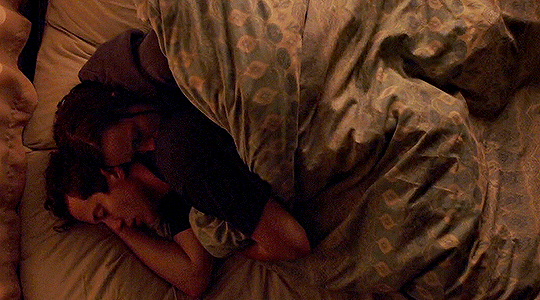
#eddie munson#joseph quinn#stranger things#stranger things 4#st4#eddie st4#st4 eddie#stranger things eddie#eddie munson fluff alphabet#stranger things fluff alphabet#fluff alphabet#eddie munson x reader
427 notes
·
View notes
Text
References to Goncharov in Brokeback Mountain
The 1973 movie Goncharov has gained its status as a cult classic partially due to the relationship between the titular Eugene Goncharov and Andrey (alias The Banker), which many fans view as romantic despite the director having denied it multiple times in interviews. Over the years, a community has formed around the presumed relationship, dedicated to writing and sharing fanfiction where the pair are romantically and/or sexually involved; the pairing remains in the top charts since the 80's. Brokeback Mountain (2006) has similarly spawned a lasting fanbase. Unlike in Goncharov, there can be no question as to the nature of the relationship between the protagonists, however, the movie contains several references to the Martin Scorsese picture.
Moose. The protagonists of Brokeback Mountain shoot a moose for meat in a seemingly insignificant scene in the beginning of the movie, however, it parallels the assassination of a rich mobster in Goncharov. The money of the man is the "meat" gained by Eugene and Andrey, although they end up paying a high price for it.
Ennis' breakdown. After a summer with Jack, seeing him drive away makes the protagonist drop down to his knees in an alleyway, banging his fist on the wall. The scene is shot in a specific manner: the viewer looks out of the dark alleyway, only seeing the man's silhouette. A very similar shot is present in the beginning of Goncharov, after the man himself decides to leave for Italy, leaving Andrey behind. Although he's just as devastated, there's no crying, no visceral emotion - Eugene only sits leaning against the wall, smoking a cigar. What really gives this reference away is both men's response to a staring passerby: "what are you looking at?"
Reunion observed. There are many similarities between Katya and Alma, from their relationships with the protagonists to the color palettes in their wardrobes, but the most glaring of all is revealed when Ennis and Jack are reunited after four years apart. They're shown pressing each other to the wall and kissing hard, which is when Alma thinks to look out the window. A look of confusion, then anger and sadness, appears on her face, very similar to Katya's reaction to Andrey and Eugene’s reunion. They are, of course, not kissing, merely talking and laughing as the shot pans away from them to Katya playing the piano, the music drowning out the conversation. Her expression may be interpreted as fear for the future now that the criminal couple are back together, but shippers prefer to view it as jealousy.
“It can be like this forever” is a phrase Andrey utters in the famous smoking in the rain scene, referring to the life him and Eugene could share. Much like in Brokeback Mountain, this dream never comes true - both couples cannot live together in a world that does not accept their love. This is the whole point of the 2006 film, its tragedy, and while the Scorsese classic is a gangster movie first and foremost, an argument can be made that the many atrocities committed in Goncharov could’ve been prevented if the two protagonists were allowed their peaceful life. It is interesting to note that Ennis and Eugene have radically different approaches to the situation: the former stays completely passive, perfectly illustrated by the quote “if you can’t fix it, then you gotta stand it”, while the latter turns to mindless violence in the name of his beloved.
***
In conclusion, the similarities between Goncharov and Brokeback Mountain are too numerous to be unintentional. Perhaps it is the director’s way of highlighting the tragic nature of the story, hinting at his opinion on the relationship between Eugene and Andrey or simply celebrating the complex and exhilarating Martin Scorsese classic.
#brokeback mountain#goncharov#long post#unreality#tw unreality#Goncharov is not real but brokeback Mountain is#watch it it's very good#you will get verysad but also filled with such Feelings
7 notes
·
View notes